- Home
- Ann M. Martin
Better to Wish
Better to Wish Read online
Contents
Title Page
Dedication
Prologue
Chapter 1
Chapter 2
Chapter 3
Chapter 4
Chapter 5
Chapter 6
Chapter 7
Chapter 8
Chapter 9
Chapter 10
Chapter 11
Chapter 12
Chapter 13
Chapter 14
Chapter 15
Chapter 16
Chapter 17
Chapter 18
Chapter 19
Epilogue
Acknowledgments
About the Author
Also by Ann M. Martin
Copyright
When I was eight years old, an hour could seem like a week and a summer could seem like an eternity. But Mama would say to Rose and me, “Time is flying.”
When I was eight, what I wanted to be was ten. A two-number age. When I was ten, I wanted to be twelve. When I was twelve, I wanted to be sixteen. I wanted to be an adult, I wanted to drive a car, I wanted to have a job, I wanted to be independent, I wanted to be a mother.
The years rolled by and eventually I realized that they were rolling faster and faster, and that Mama had been right after all. Time was flying.
I’ve gotten a lot of things I wished for — children, grandchildren, great-grandchildren. And I’ve experienced a few things I wouldn’t wish on anybody. Pop once said it’s a good thing we don’t know what’s around the corner. I didn’t understand what he meant then, but I do now. It’s better to wish than to know.
When you have the pleasure of being one hundred years old, when your mind is clear and sharp and you can revisit an afternoon that’s ninety-five years past as easily as you can visit yesterday afternoon, then you can piece together the kaleidoscope bits of your life. But like a kaleidoscope, the picture is different every time. Fred is there and then he’s gone and then he appears again. Zander swirls into focus slowly and disappears with a great swoop that is unexpected, even now. And Mama and Sarah and Adele, they come and go. Love, too. And money. It’s crass, but you can’t forget about the money, although it means more to some than to others.
Generation following generation, the little ones who didn’t make it, the grown ones who stuck around longer than maybe they should have been allowed. And the secrets. The things hidden and the things unsaid that sometimes cause more trouble and more grief as the years pile up, more than the things brought out into the sunshine for all to see.
But even secrets have their place.
Sitting by the window now, in the shadow of a chestnut tree, longing for a view from a different window in a different time, I dig through my memories and choose one from Lewisport, my first home.
The night of August 13th was going to be one of the best of the whole summer. Abby Nichols knew it, her sister Rose knew it, every kid up and down their sandy lane knew it. It was just an ordinary weekday in tiny Lewisport, Maine, not a holiday, but by the time darkness fell and the fireflies were blinking, the field across from the Methodist church would be ablaze with lanterns. Nearly everyone in town would be turning out to eat candy apples, win Kewpie dolls at the arcade, and gawk at the posters by the entrance to the sideshow. The signs announcing the traveling fair — ONE NIGHT ONLY! — had promised a two-headed snake, and Abby did not intend to miss out on that.
Abby thought about the snake, which she felt sorry for but wanted to see anyway, and about the bearded lady and the fat lady and crab man, who supposedly had crab claws instead of hands. She had only a dime to spend at the fair, and a nickel of that would go toward the sideshow. Maybe her father would relent and give her and Rose an extra dime each, but money had always been tight in the Nichols household, and was even tighter now that the Great Depression had fallen over the country, so extra dimes seemed unlikely.
Abby turned on her side, propped her chin in her hand, and looked out the open bedroom window. In the gray dawn she could see the sand on the other side of Blue Harbor Lane and, beyond that, the dark expanse of the ocean. She heard waves rolling in and saw the shapes of gulls wheeling low over the water. The damp salt air was inside, outside, everywhere, making the bedsheets nearly as wet and heavy as sails.
“Abby?” Rose whispered from her side of the bed. “What’s the first thing you’re going to do tonight?”
Abby rolled over again and faced her little sister. “Go to the sideshow.”
“Really? You’re going to spend a whole nickel right away?”
“Don’t you want to see the sideshow?”
“Yes, but … Abby, now don’t tell.”
Abby sighed. “Don’t make me promise not to tell something.” She looked sternly at her little sister. “Please, Rose.”
“But I have a plan. And if we tell it, it won’t come true.”
“Then don’t tell me. Keep it a secret.”
Rose made a face at Abby and said, “Okay-ay. If you don’t want to know my plan.”
The room lightened, and the white curtains that Abby’s mother had made shifted in the breeze. Abby sat up, swung her legs over the edge of the bed, and, resting her arms on the windowsill, peered down at the road below.
“There’s Orrin,” she said.
“Got his bucket?” asked Rose.
“He’s always got his bucket.” Abby leaned out the window. “Orrin!” she called softly. “Orrin!”
Orrin Umhay, an old cap of his father’s on his head and a hankie trailing out of one back pocket, grinned up at Abby from the quiet lane. Setting down his empty bucket, he asked, “Want to come with me?”
“Blueberries or clams?” asked Abby.
“Blueberries.”
Abby looked over her shoulder at Rose. “Want to go pick blueberries with Orrin?”
Rose stretched her skinny six-year-old legs. “Yes.”
“We’ll be right down,” Abby whispered as loudly as she dared, and she pulled her head back inside.
Rose was already wriggling into her gingham dress, the blue one that Mama had made Abby two years earlier for her sixth birthday.
“Dungarees,” said Abby, and pulled the dress off Rose’s head. “You’ll get all scratched up if you wear a dress for blueberry picking. Hang that up. You can wear it later.”
“You don’t know everything,” muttered Rose, but she put on her dungarees.
“Pop’s up,” Abby said a few minutes later. She was listening cautiously at the door. “We can stop whispering. I hear him downstairs.”
“Maybe he won’t let us go.”
Abby considered this. “Don’t say we’re going with Orrin. Just tell him we’re going blueberry picking.” She brightened. “If he asks, tell him we’re picking them as a surprise for Mama.”
“All right. But where’s Orrin?”
“Gone ahead. Pop won’t see him.”
Abby and Rose slipped out of their room, the only one on the second floor, and crept to the bottom of the stairs. Luther, their pop, had built the house with his own hands while he was courting Nell, their mama. Pop was the best carpenter in Lewisport, maybe in Barnegat Point, too. Abby had heard people say that many times, and she was proud of her father.
“Where are you girls off to so early?” asked Pop from his place at the kitchen table.
“Blueberry picking,” said Rose.
And Abby said, glaring at her sister, “May we go blueberry picking?”
Pop glanced through the window. “Isn’t even light out yet.”
“It’s almost,” said Rose. “Please?”
“Let them go,” spoke up Mama. She turned from the stove and set a plate of eggs in front of Pop.
Pop was always up early. “Early bird catches the worm,” he l
iked to say. “Times may be hard, but there’s no excuse for a healthy man not to be holding down a job.”
And Mama was usually up early, too, to make sure Pop got a good breakfast in him before he went off to whatever carpentry job he had found. If Mama wasn’t up early, it was because she was having one of her bad days, her mind stuck thinking of the two rosebushes and what they meant.
Abby and Rose scuttled out the door before Pop could disagree with Mama, and they caught up with Orrin, who was waiting at the edge of the woods near the spot where Blue Harbor Lane abruptly ended at a rocky beach.
“Hey,” said Abby.
“Hey,” said Orrin.
Abby had known Orrin since they were five, but she had fallen in love with him three months earlier, toward the end of second grade. She couldn’t tell him, though. Some thoughts were better left secret.
“How much money have you got for the fair?” asked Rose as they tramped along the path toward the best blueberry bushes. Abby kicked her ankle, but it was too late.
“Not saying,” Orrin replied, and then Abby knew for sure that Orrin didn’t have any money at all.
Abby felt like hurting Rose, or at least making her feel as awkward as Orrin looked. “Why don’t you tell us your plan for tonight at the fair?” she asked her sister.
“What plan?” said Orrin with interest.
“I said it was a secret!” cried Rose.
“But I thought you wanted me to guess.”
“Oh, I’ll just tell you anyway.” Rose stopped and plucked a blueberry from a scrubby bush and dropped it into the bucket she and Abby were sharing. “I’m going to win a tea set at the ring toss game. I know there’ll be a tea set there. If I toss very, very carefully, I bet I can win one with five turns. And if I can’t, then I’m going to use my other five cents for five more turns instead of going to the sideshow. But I’m going to get a tea set tonight.”
“Good luck,” said Orrin, and Abby could tell that he meant it.
The sun grew stronger and the day grew hot. When Abby and Rose got home and gave Mama the bucket of berries, she fed them breakfast and then scatted them up the wooden staircase to change out of their dungarees and into dresses. Mama was good with a sewing machine, and Abby’s dresses were handmade, which was nice, but her friend Sarah Moreside sometimes got to go to the dress shop in Barnegat Point and pick out a store-bought dress.
Downstairs, the front door banged and Abby heard Sarah say, “Can Abby come out?”
“Abby!” called Mama. “Sarah’s here.”
Abby buttoned the last button on her dress, grabbed her red socks, and hurried downstairs with Rose at her heels.
“You go play with Emily,” Abby said over her shoulder.
“Oh, let her play with us,” said Sarah. “It’s okay. Look — new paper dolls. Gran sent them for my birthday. We can all cut out her dresses.”
Abby gaped at the flawless pages of outfits for a chubby girl named Little Judy, who at the moment was wearing only frilly underwear. Sarah’s offer was very generous, considering that Rose was still hopeless with scissors.
Abby and Sarah and Rose sat on Sarah’s front stoop in the warm sun and painstakingly clipped out Little Judy’s traveling suit and seaside outfit and lavish lavender Christmas dress and her many, many “School Daze” dresses.
“Imagine having this many clothes,” said Rose, concentrating furiously on her scissors, wisps of hair escaping from her braids. “Little Judy must be rich.”
“No one’s rich these days,” said Sarah.
Abby glanced up from the page of Little Judy’s complicated traveling suit. “President Hoover must be rich.”
“Girls! Come inside, please,” called Mama from three doors away.
“We’ll meet you back here later,” Abby said to Sarah, jumping to her feet.
At home, Mama insisted that Rose and Abby change into fresh dresses and fresh socks and eat soup even though the soup was hotter than the day. “And you need a rest,” she said to Rose, who protested until Mama reminded her that she would be up late that night at the fair.
Abby trailed back out of her house. Farther down Blue Harbor Lane, she could see three girls jumping rope, and Orrin and his brother trying to ride a little cart they had built themselves using boards and old wheels from a wagon. Sarah wasn’t on her stoop yet, so Abby wandered around behind her own house and stood on the sandy ground and looked at the two rosebushes that Pop had planted, one in 1927 and one in 1928, each time one of Mama’s babies hadn’t lasted long enough to be born proper. On the babies’ headstones in the graveyard at the church were their names: Millicent Pryor Nichols and Luther Randolph Nichols Jr. But the bushes were just plain bushes without any kind of markers. And they made Mama sad. Sometimes Abby wished they hadn’t been planted in the yard where Mama could see them every day.
Sarah called to Abby then, and they worked on Little Judy’s outfits for a while longer. Then Rose came outside after her nap and a gang of Blue Harbor Lane children played a noisy game of kick-the-can. Finally the girls split off from the boys to take turns jumping rope, and before Abby knew it, Mama was calling her and Rose inside again. It was time to get ready for the fair.
The people of Lewisport walked to the Methodist church after supper, the children scrubbed and shining, the adults tired but hopeful, pockets jingling with pennies and nickels and dimes. Abby and Rose were wearing their third dresses of the day, and their dimes were tucked into the change purses that they wore on chains around their necks.
“Remember not to say about my plan,” Rose whispered to Abby. “It’s a secret. If you say anything, you’ll jinx it.”
The lights of the fair blinked in front of them.
“Lanterns!” said Abby under her breath. “It’s beautiful! Remember last year?” She turned to Mama and Pop. Last year there had been a small Ferris wheel and Abby had ridden it so many times she had run out of money. That was why she planned to go to the sideshow first this year, before anything else. “Look, there are Sarah and Emily and Francis and Douglas. Can we walk around with them?”
“Stay together,” said Pop.
“Abby, keep an eye on your sister,” added Mama.
Abby took Rose by the hand and they ran to their friends. Everyone wanted to see the two-headed snake, except for Rose, who wanted to start winning her tea set.
“Five against one. We win,” said Douglas, glaring at Rose and jamming his hands in his pockets.
“We’ll go to the arcade right after the sideshow,” Abby promised her sister.
“Well, I’m not going in. I’m not spending half my money.”
Abby was getting very tired of Rose’s stubbornness, but once Rose made up her mind, she was hard to budge. In the end, Abby and Sarah waited with Rose while the others went inside, and then they switched off. Rose resolutely refused to use up half her dime, even when Abby ran out of the wooden trailer, crying, “Rose! It really is a two-headed snake! Two heads, four eyes. And there’s a man with claws for hands, just like the signs say!”
But Rose would not give up on her tea set plan. She ignored Abby. “The arcade, the arcade!” she said, pulling her sister’s hand. She led the way along the rows of games, past the flashing lights and ringing bells and the pop-pop of air guns to the tamer ring toss booth, with its board of prizes at the back.
Rose studied the board. At last she pointed and said, “Look. A china tea set. That’s what I want.”
Abby looked at the tiny china cups and plates and saucers, packed into a fancy wooden box. “But, Rose,” she whispered, “you have to get the ring over the exact middle pop bottle to win that. It’s almost impossible.”
Rose set her jaw. “I can do it.” She handed her dime to the skinny man in a striped shirt who was holding a handful of small wooden rings. “Five, please, mister,” she said.
Abby and Sarah watched as Rose, frowning, carefully tossed her rings, one after the other, onto the grid of pop bottles. Most of them fell between the cracks. One landed
to the side, missing the bottles altogether. Rose used her remaining five cents to buy five more tries. When she reached for the tenth ring, Abby said to her, “Here,” and held out her nickel, but Rose shook her head. “I have to do it with my own money.”
She squinted one eye shut and carefully tossed out the last ring. It bounced off the edge of a bottle and landed on the ground.
“Oh! So sorry, little lady,” said the man in the striped shirt. “Here. A consolation prize.” He reached for a balloon, which he fastened to a stick before giving it to Rose.
Rose would not cry. She walked ahead of Abby and Sarah down the midway, the balloon bouncing at her side, until Abby saw a man selling ice cream, and bought one for herself and one for her sister.
Their money was gone. But the carnival blinked and pinged and flashed around them, and the lanterns glowed. Rose held tight to her balloon and Abby thought of the wonders of the sideshow and decided she would write about the two-headed snake on the first day of third grade in Barnegat Point, when her teacher was bound to ask the students about their summer vacations.
Long years later, when Abby was old, very old, she liked to recall this evening. Not because Rose had lost her dime, of course, but because it was pleasant to dwell in this time when losing a dime was the biggest worry she and Rose faced. They hadn’t yet learned that it was better not to know what was waiting for them around the corner.
Abby and Rose lay in their bed, wrapped in each other’s arms. There was no wood stove in their little room upstairs, which was all right in the summer. But this was Thanksgiving Day, and even tucked under the bedclothes in her flannel nightgown, Abby shivered.
She felt Rose’s breath against her neck, as light as the wing of a moth. “Did you look outside?” Rose whispered.

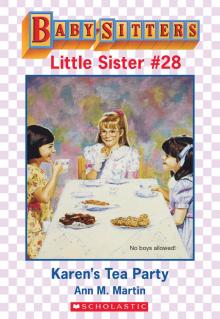 Karen's Tea Party
Karen's Tea Party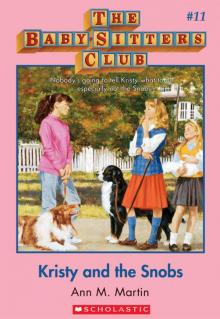 Kristy and the Snobs
Kristy and the Snobs Best Kept Secret
Best Kept Secret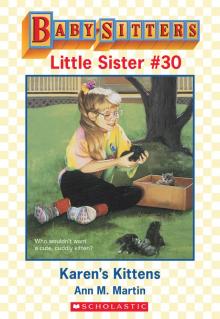 Karen's Kittens
Karen's Kittens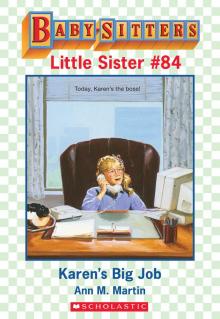 Karen's Big Job
Karen's Big Job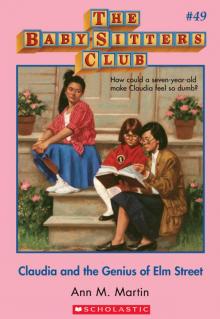 Claudia and the Genius of Elm Street
Claudia and the Genius of Elm Street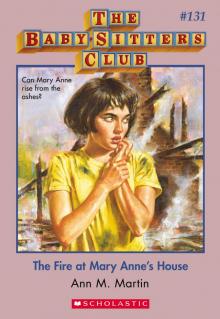 The Fire at Mary Anne's House
The Fire at Mary Anne's House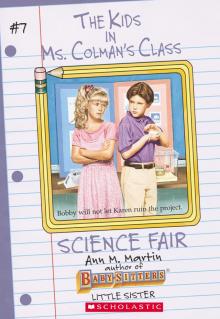 Science Fair
Science Fair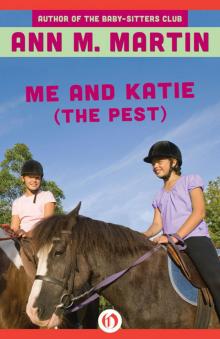 Me and Katie (The Pest)
Me and Katie (The Pest)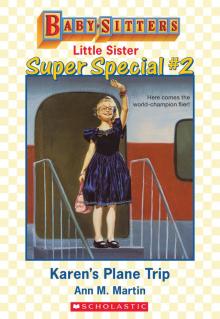 Karen's Plane Trip
Karen's Plane Trip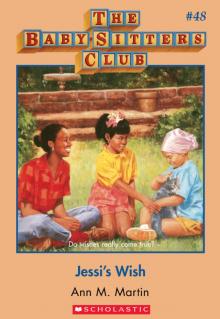 Jessi's Wish
Jessi's Wish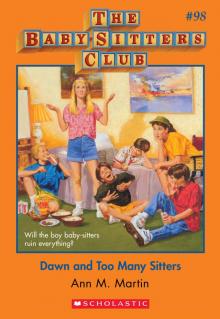 Dawn and Too Many Sitters
Dawn and Too Many Sitters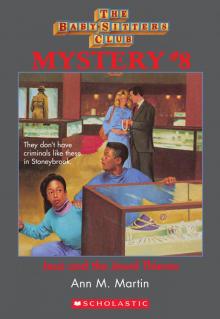 Jessi and the Jewel Thieves
Jessi and the Jewel Thieves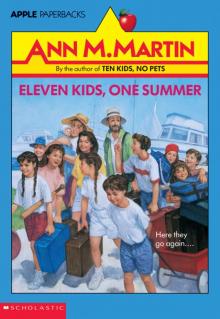 Eleven Kids, One Summer
Eleven Kids, One Summer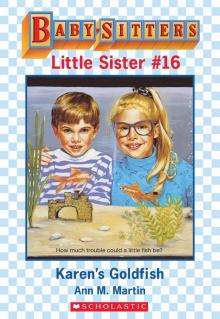 Karen's Goldfish
Karen's Goldfish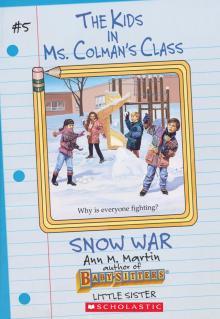 Snow War
Snow War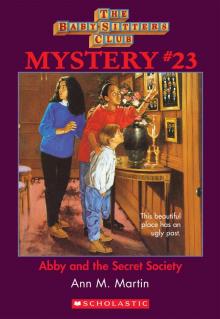 Abby and the Secret Society
Abby and the Secret Society Keeping Secrets
Keeping Secrets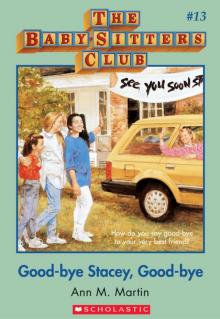 Good-Bye Stacey, Good-Bye
Good-Bye Stacey, Good-Bye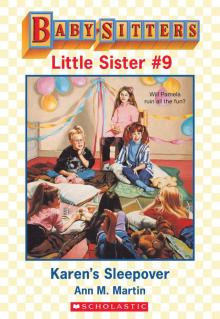 Karen's Sleepover
Karen's Sleepover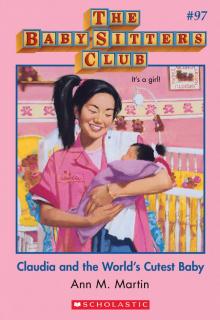 Claudia and the World's Cutest Baby
Claudia and the World's Cutest Baby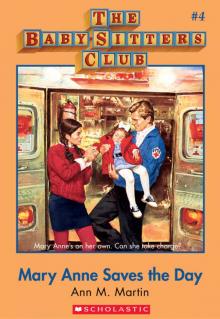 Mary Anne Saves the Day
Mary Anne Saves the Day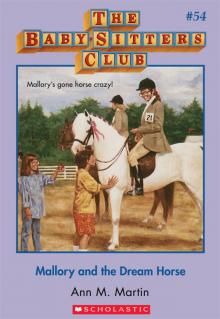 Mallory and the Dream Horse
Mallory and the Dream Horse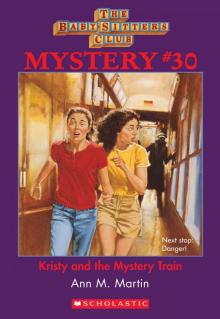 Kristy and the Mystery Train
Kristy and the Mystery Train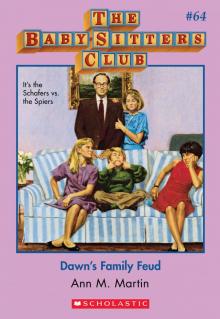 Dawn's Family Feud
Dawn's Family Feud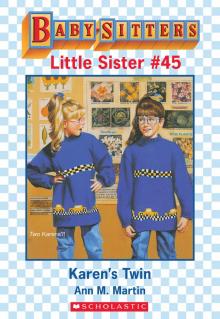 Karen's Twin
Karen's Twin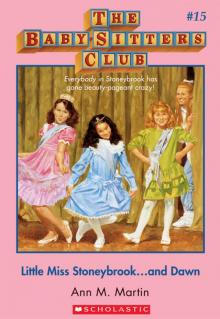 Little Miss Stoneybrook... And Dawn
Little Miss Stoneybrook... And Dawn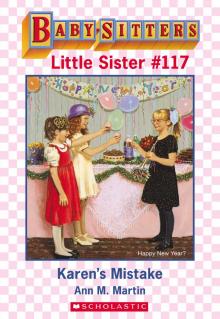 Karen's Mistake
Karen's Mistake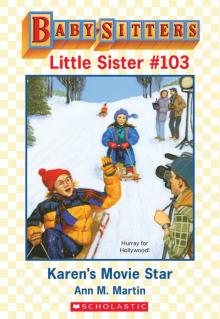 Karen's Movie Star
Karen's Movie Star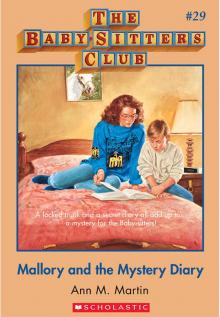 Mallory and the Mystery Diary
Mallory and the Mystery Diary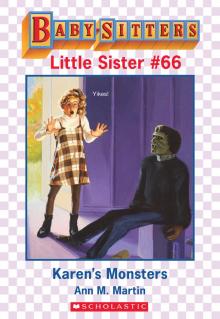 Karen's Monsters
Karen's Monsters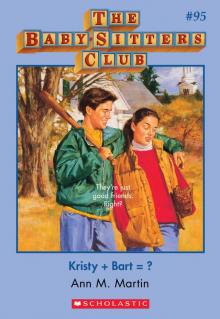 Kristy + Bart = ?
Kristy + Bart = ?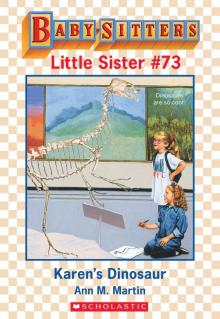 Karen's Dinosaur
Karen's Dinosaur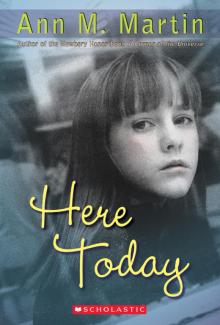 Here Today
Here Today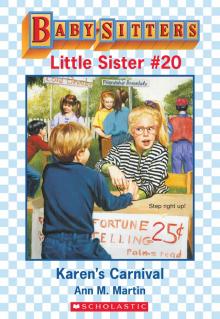 Karen's Carnival
Karen's Carnival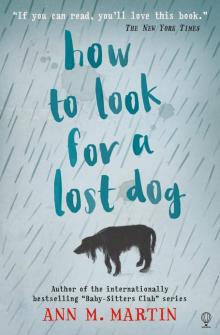 How to Look for a Lost Dog
How to Look for a Lost Dog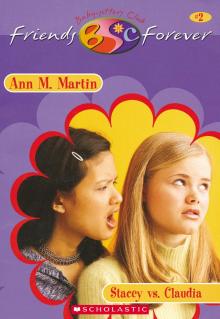 Stacey vs. Claudia
Stacey vs. Claudia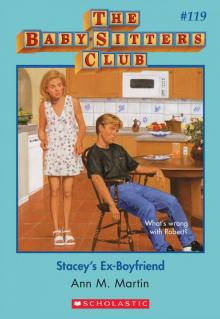 Stacey's Ex-Boyfriend
Stacey's Ex-Boyfriend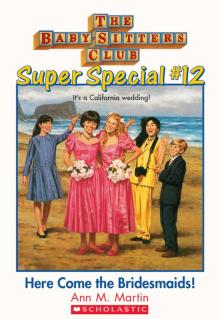 Here Come the Bridesmaids!
Here Come the Bridesmaids! Graduation Day
Graduation Day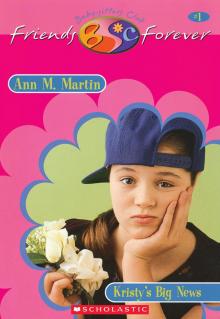 Kristy's Big News
Kristy's Big News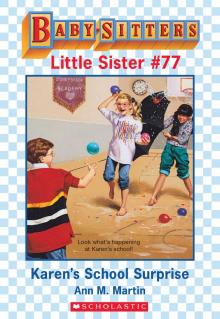 Karen's School Surprise
Karen's School Surprise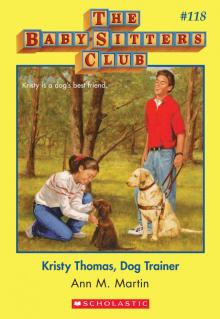 Kristy Thomas, Dog Trainer
Kristy Thomas, Dog Trainer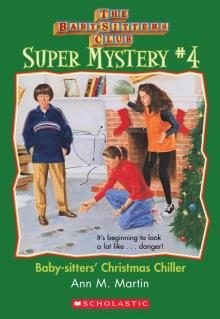 Baby-Sitters' Christmas Chiller
Baby-Sitters' Christmas Chiller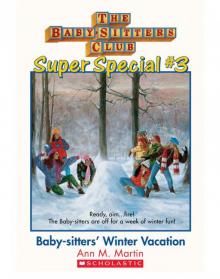 Baby-Sitters' Winter Vacation
Baby-Sitters' Winter Vacation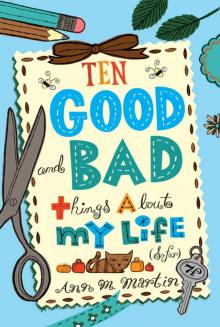 Ten Good and Bad Things About My Life
Ten Good and Bad Things About My Life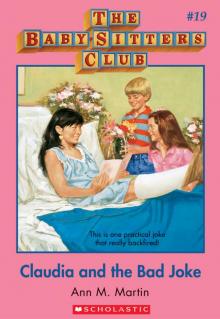 Claudia and the Bad Joke
Claudia and the Bad Joke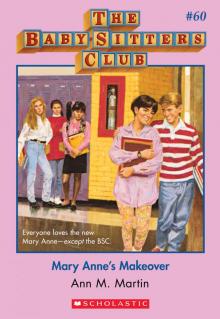 Mary Anne's Makeover
Mary Anne's Makeover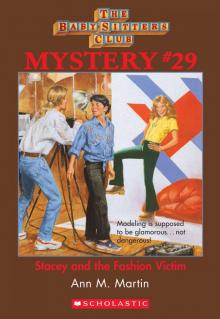 Stacey and the Fashion Victim
Stacey and the Fashion Victim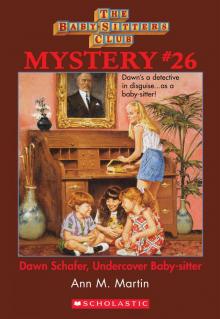 Dawn Schafer, Undercover Baby-Sitter
Dawn Schafer, Undercover Baby-Sitter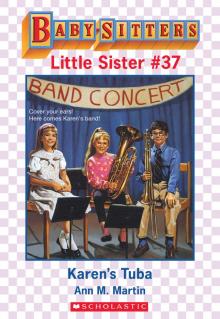 Karen's Tuba
Karen's Tuba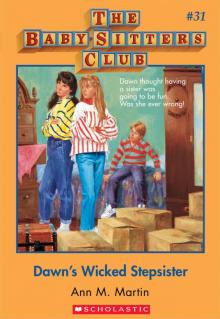 Dawn's Wicked Stepsister
Dawn's Wicked Stepsister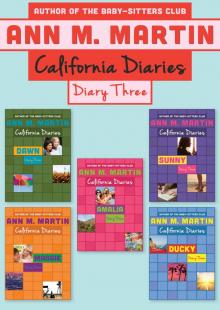 Diary Three: Dawn, Sunny, Maggie, Amalia, and Ducky
Diary Three: Dawn, Sunny, Maggie, Amalia, and Ducky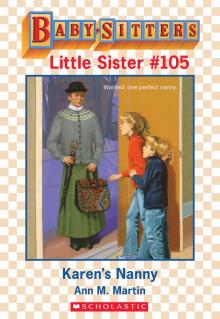 Karen's Nanny
Karen's Nanny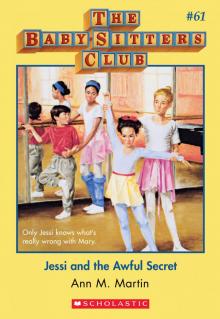 Jessi and the Awful Secret
Jessi and the Awful Secret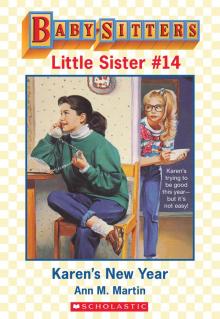 Karen's New Year
Karen's New Year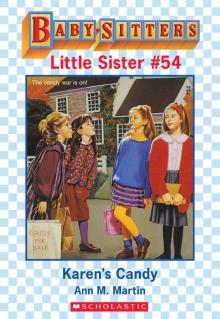 Karen's Candy
Karen's Candy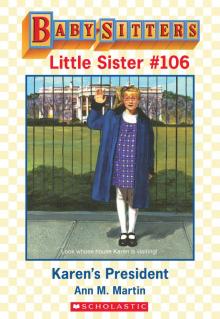 Karen's President
Karen's President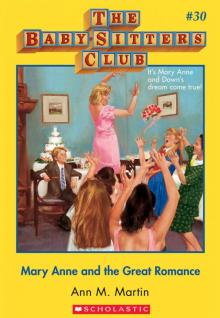 Mary Anne and the Great Romance
Mary Anne and the Great Romance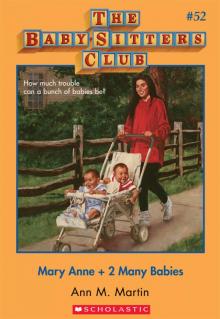 Mary Anne + 2 Many Babies
Mary Anne + 2 Many Babies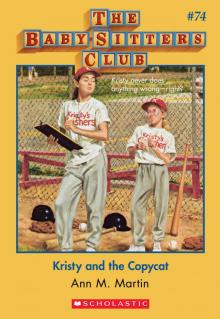 Kristy and the Copycat
Kristy and the Copycat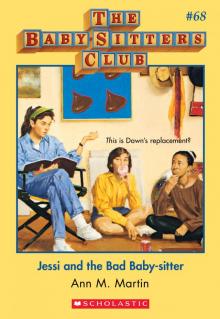 Jessi and the Bad Baby-Sitter
Jessi and the Bad Baby-Sitter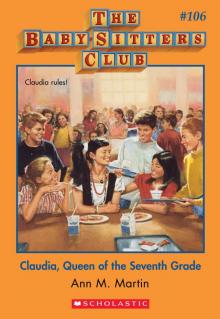 Claudia, Queen of the Seventh Grade
Claudia, Queen of the Seventh Grade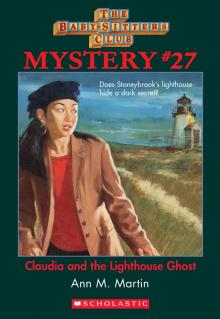 Claudia and the Lighthouse Ghost
Claudia and the Lighthouse Ghost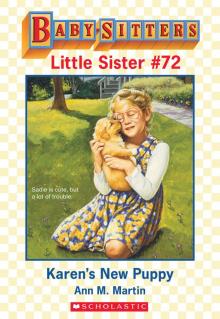 Karen's New Puppy
Karen's New Puppy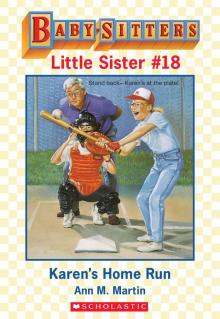 Karen's Home Run
Karen's Home Run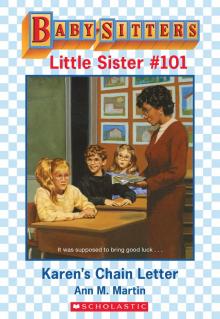 Karen's Chain Letter
Karen's Chain Letter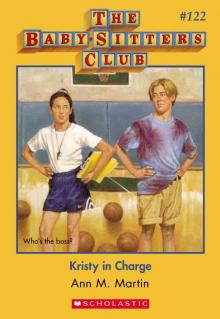 Kristy in Charge
Kristy in Charge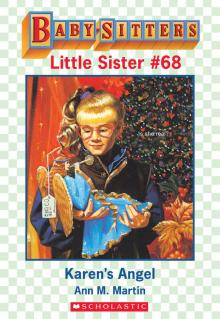 Karen's Angel
Karen's Angel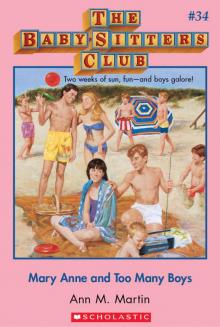 Mary Anne and Too Many Boys
Mary Anne and Too Many Boys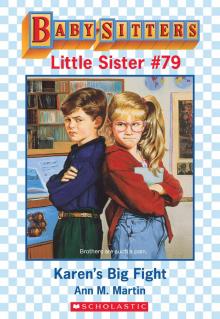 Karen's Big Fight
Karen's Big Fight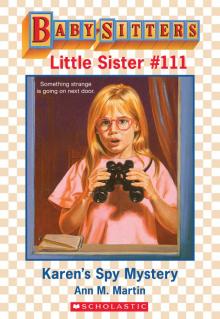 Karen's Spy Mystery
Karen's Spy Mystery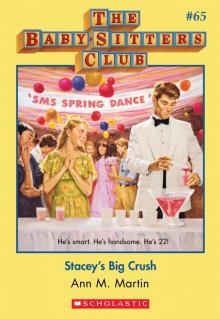 Stacey's Big Crush
Stacey's Big Crush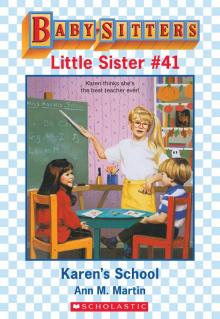 Karen's School
Karen's School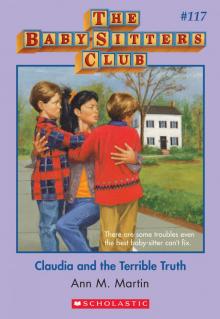 Claudia and the Terrible Truth
Claudia and the Terrible Truth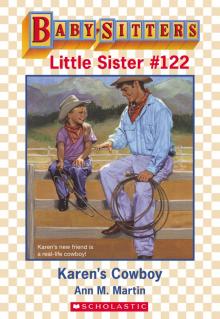 Karen's Cowboy
Karen's Cowboy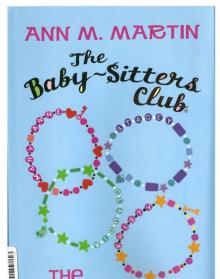 The Summer Before
The Summer Before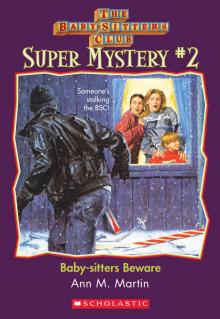 Beware, Dawn!
Beware, Dawn!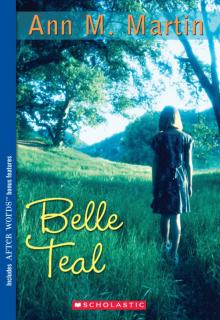 Belle Teale
Belle Teale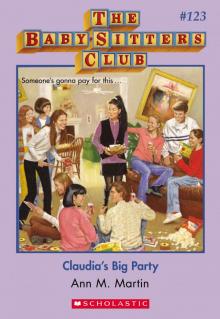 Claudia's Big Party
Claudia's Big Party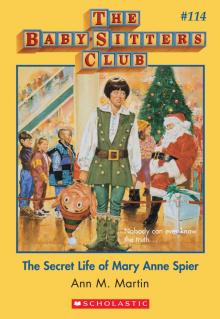 The Secret Life of Mary Anne Spier
The Secret Life of Mary Anne Spier Karen's Book
Karen's Book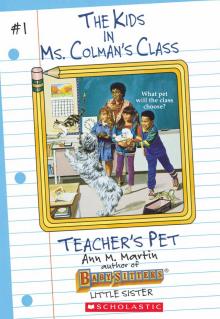 Teacher's Pet
Teacher's Pet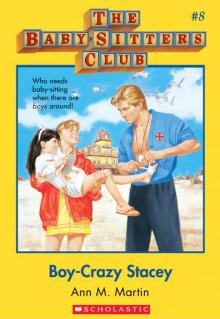 Boy-Crazy Stacey
Boy-Crazy Stacey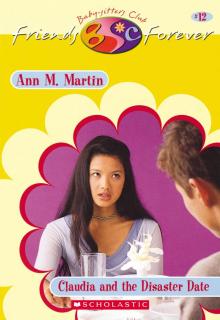 Claudia and the Disaster Date
Claudia and the Disaster Date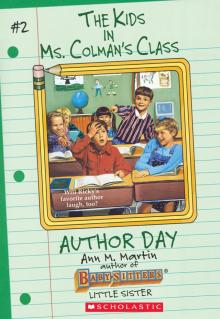 Author Day
Author Day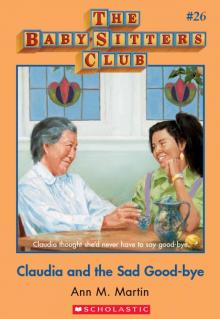 Claudia and the Sad Good-Bye
Claudia and the Sad Good-Bye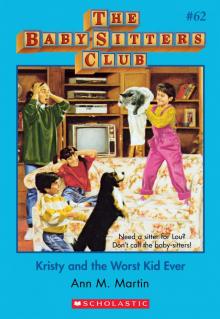 Kristy and the Worst Kid Ever
Kristy and the Worst Kid Ever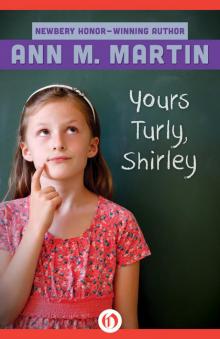 Yours Turly, Shirley
Yours Turly, Shirley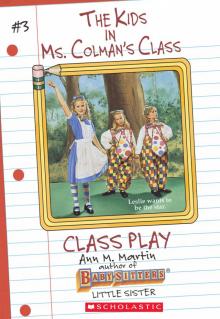 Class Play
Class Play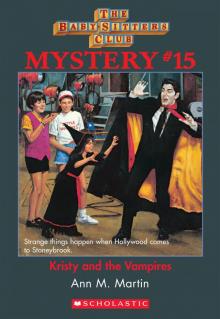 Kristy and the Vampires
Kristy and the Vampires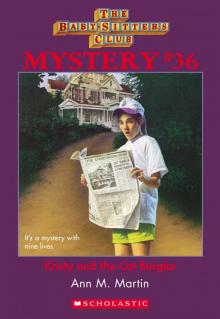 Kristy and the Cat Burglar
Kristy and the Cat Burglar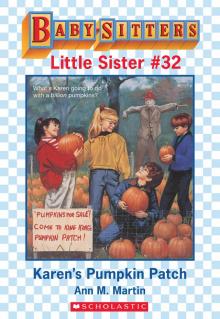 Karen's Pumpkin Patch
Karen's Pumpkin Patch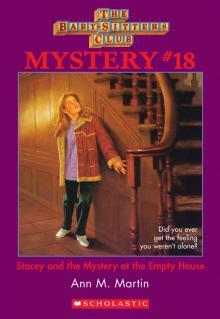 Stacey and the Mystery at the Empty House
Stacey and the Mystery at the Empty House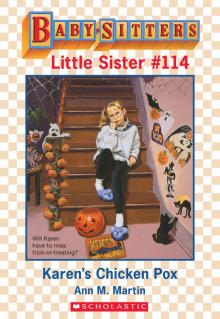 Karen's Chicken Pox
Karen's Chicken Pox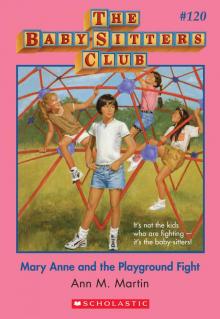 Mary Anne and the Playground Fight
Mary Anne and the Playground Fight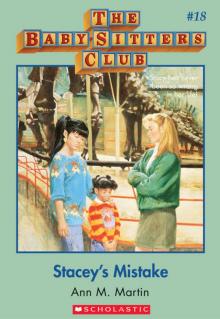 Stacey's Mistake
Stacey's Mistake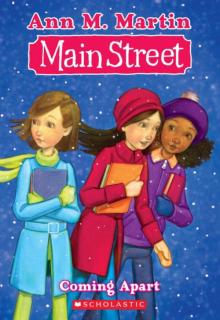 Coming Apart
Coming Apart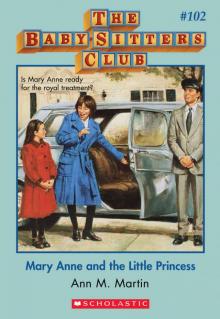 Mary Anne and the Little Princess
Mary Anne and the Little Princess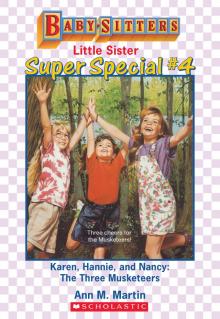 Karen, Hannie and Nancy: The Three Musketeers
Karen, Hannie and Nancy: The Three Musketeers 'Tis the Season
'Tis the Season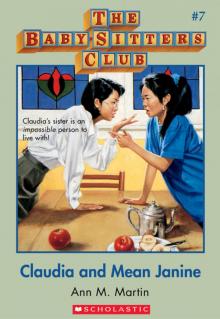 Claudia and Mean Janine
Claudia and Mean Janine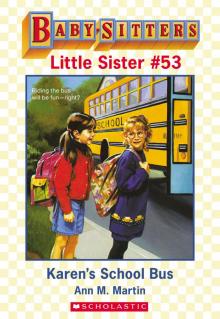 Karen's School Bus
Karen's School Bus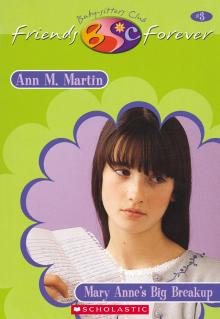 Mary Anne's Big Breakup
Mary Anne's Big Breakup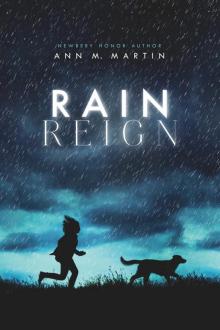 Rain Reign
Rain Reign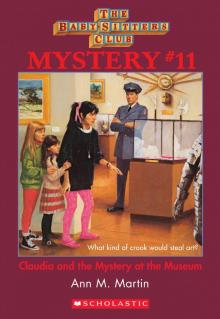 Claudia and the Mystery at the Museum
Claudia and the Mystery at the Museum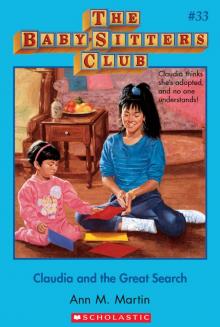 Claudia and the Great Search
Claudia and the Great Search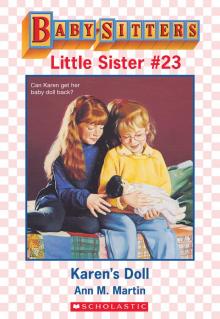 Karen's Doll
Karen's Doll Shannon's Story
Shannon's Story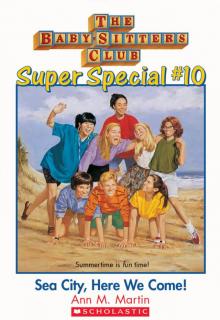 Sea City, Here We Come!
Sea City, Here We Come!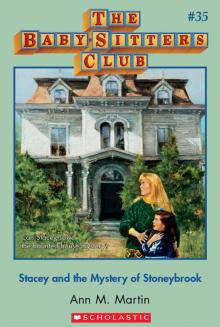 Stacey and the Mystery of Stoneybrook
Stacey and the Mystery of Stoneybrook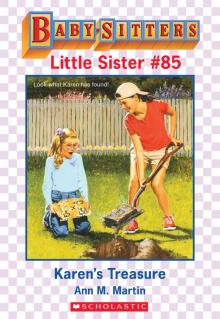 Karen's Treasure
Karen's Treasure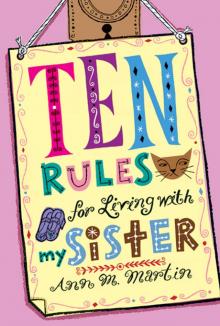 Ten Rules for Living With My Sister
Ten Rules for Living With My Sister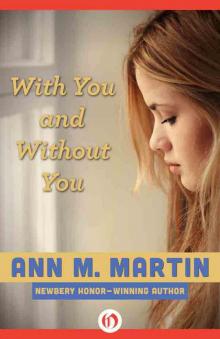 With You and Without You
With You and Without You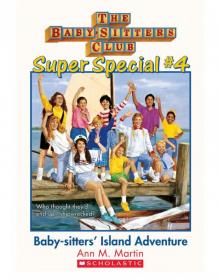 Baby-Sitters' Island Adventure
Baby-Sitters' Island Adventure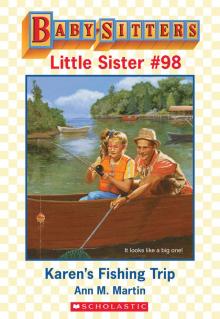 Karen's Fishing Trip
Karen's Fishing Trip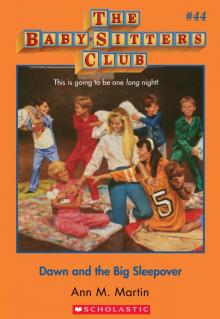 Dawn and the Big Sleepover
Dawn and the Big Sleepover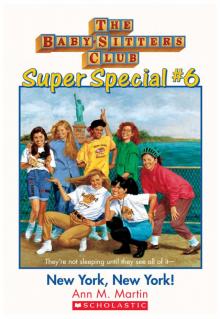 New York, New York!
New York, New York!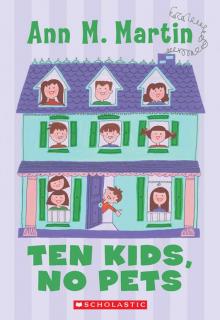 Ten Kids, No Pets
Ten Kids, No Pets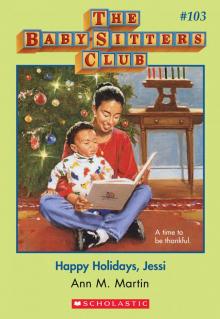 Happy Holidays, Jessi
Happy Holidays, Jessi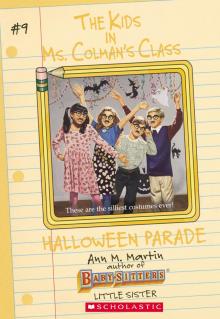 Halloween Parade
Halloween Parade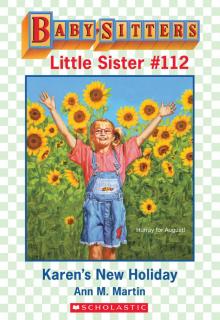 Karen's New Holiday
Karen's New Holiday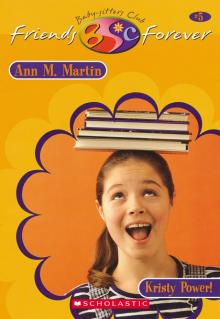 Kristy Power!
Kristy Power!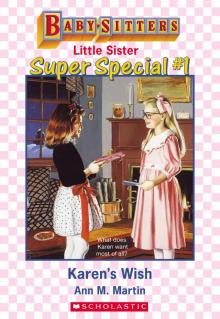 Karen's Wish
Karen's Wish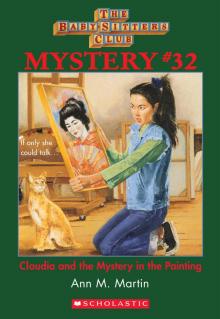 Claudia and the Mystery in the Painting
Claudia and the Mystery in the Painting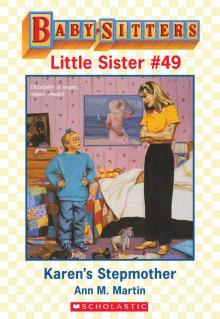 Karen's Stepmother
Karen's Stepmother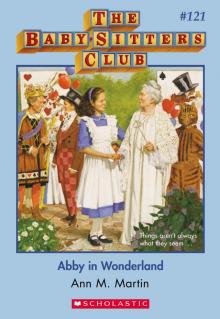 Abby in Wonderland
Abby in Wonderland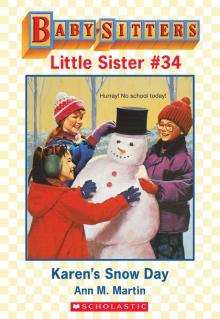 Karen's Snow Day
Karen's Snow Day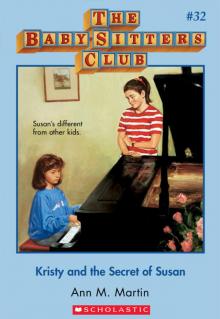 Kristy and the Secret of Susan
Kristy and the Secret of Susan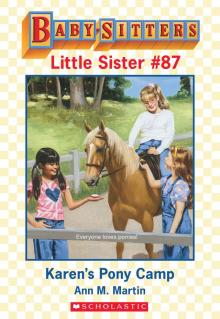 Karen's Pony Camp
Karen's Pony Camp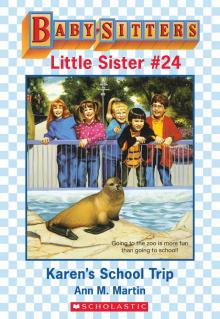 Karen's School Trip
Karen's School Trip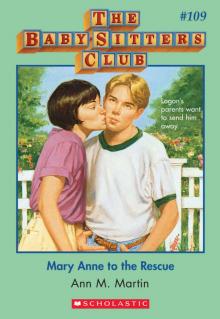 Mary Anne to the Rescue
Mary Anne to the Rescue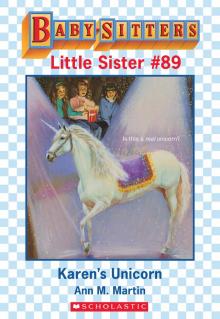 Karen's Unicorn
Karen's Unicorn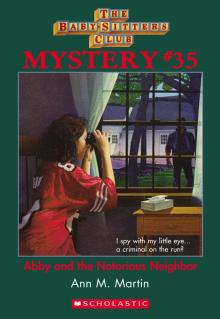 Abby and the Notorious Neighbor
Abby and the Notorious Neighbor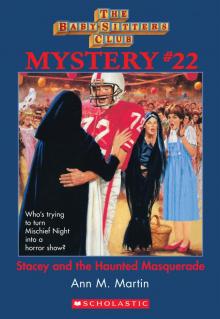 Stacey and the Haunted Masquerade
Stacey and the Haunted Masquerade Claudia Gets Her Guy
Claudia Gets Her Guy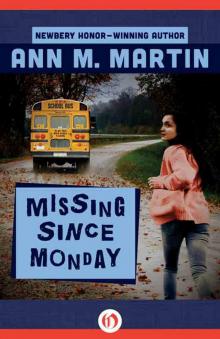 Missing Since Monday
Missing Since Monday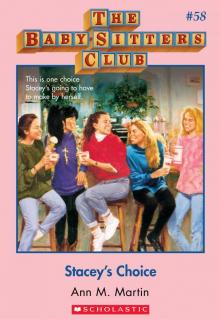 Stacey's Choice
Stacey's Choice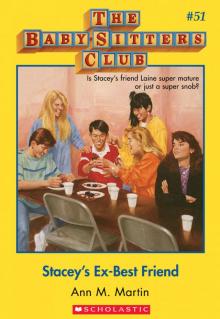 Stacey's Ex-Best Friend
Stacey's Ex-Best Friend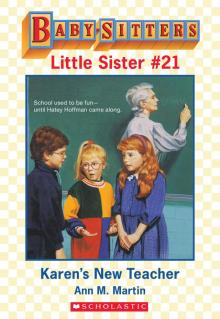 Karen's New Teacher
Karen's New Teacher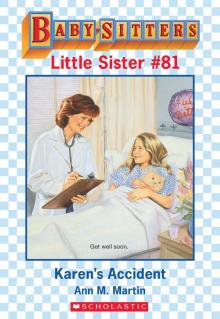 Karen's Accident
Karen's Accident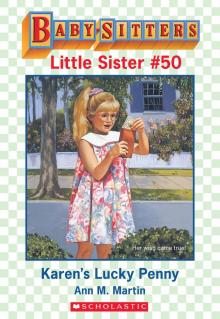 Karen's Lucky Penny
Karen's Lucky Penny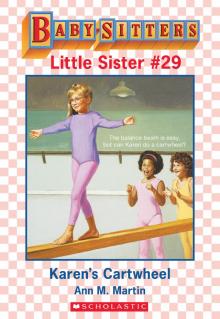 Karen's Cartwheel
Karen's Cartwheel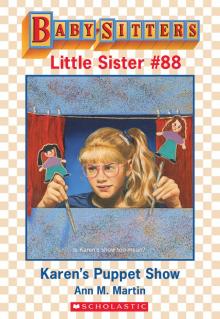 Karen's Puppet Show
Karen's Puppet Show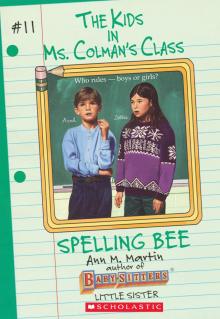 Spelling Bee
Spelling Bee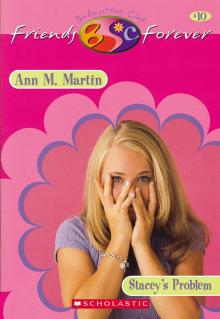 Stacey's Problem
Stacey's Problem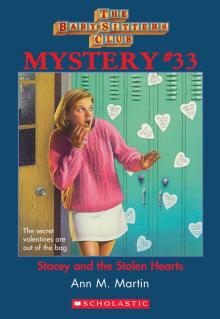 Stacey and the Stolen Hearts
Stacey and the Stolen Hearts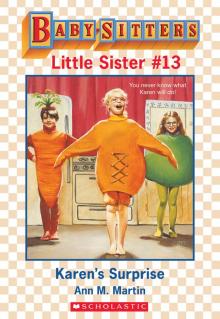 Karen's Surprise
Karen's Surprise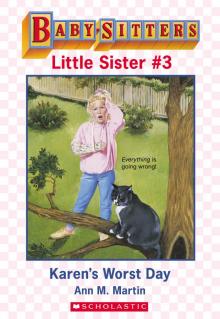 Karen's Worst Day
Karen's Worst Day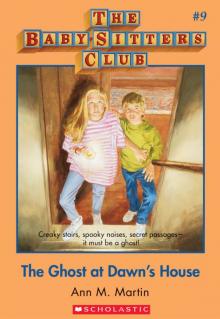 The Ghost at Dawn's House
The Ghost at Dawn's House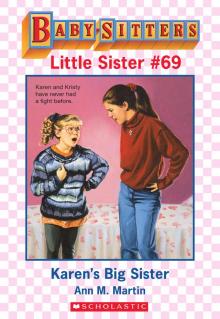 Karen's Big Sister
Karen's Big Sister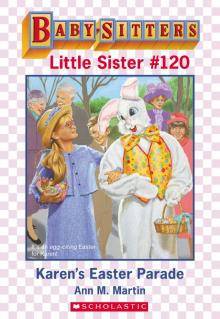 Karen's Easter Parade
Karen's Easter Parade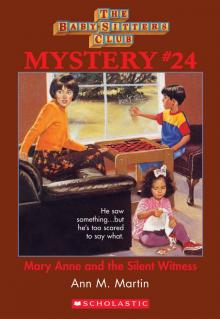 Mary Anne and the Silent Witness
Mary Anne and the Silent Witness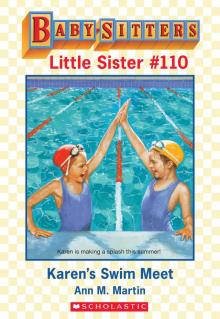 Karen's Swim Meet
Karen's Swim Meet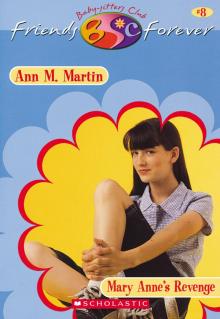 Mary Anne's Revenge
Mary Anne's Revenge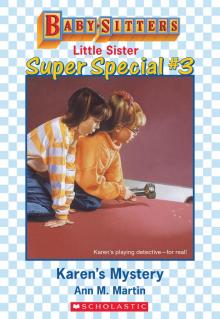 Karen's Mystery
Karen's Mystery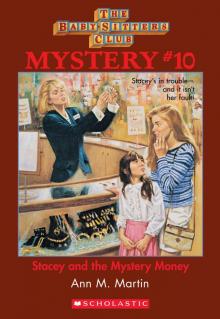 Stacey and the Mystery Money
Stacey and the Mystery Money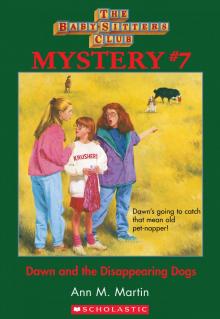 Dawn and the Disappearing Dogs
Dawn and the Disappearing Dogs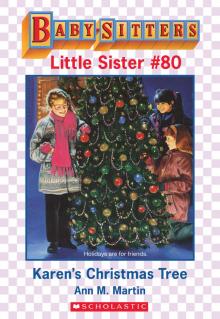 Karen's Christmas Tree
Karen's Christmas Tree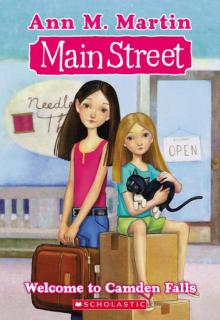 Welcome to Camden Falls
Welcome to Camden Falls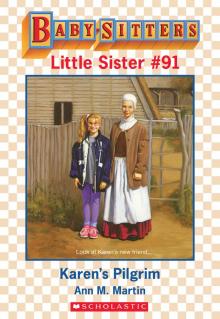 Karen's Pilgrim
Karen's Pilgrim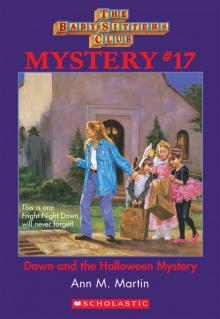 Dawn and the Halloween Mystery
Dawn and the Halloween Mystery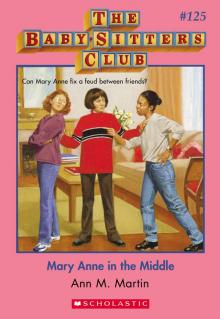 Mary Anne in the Middle
Mary Anne in the Middle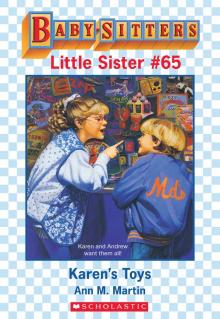 Karen's Toys
Karen's Toys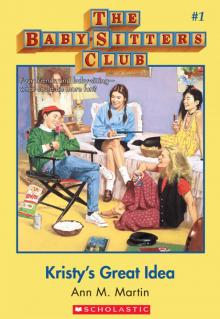 Kristy's Great Idea
Kristy's Great Idea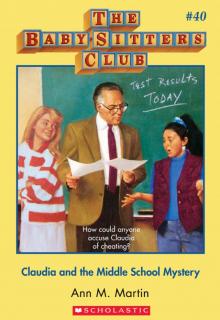 Claudia and the Middle School Mystery
Claudia and the Middle School Mystery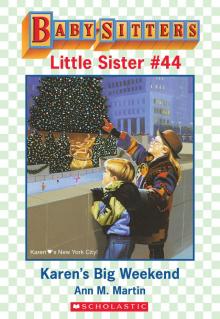 Karen's Big Weekend
Karen's Big Weekend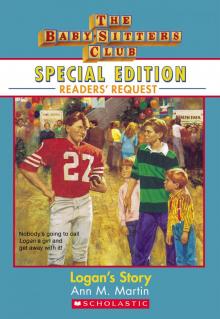 Logan's Story
Logan's Story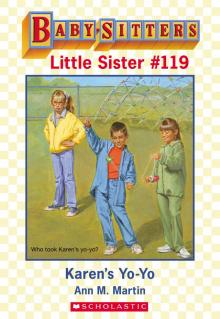 Karen's Yo-Yo
Karen's Yo-Yo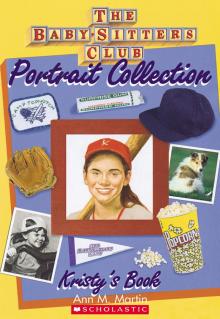 Kristy's Book
Kristy's Book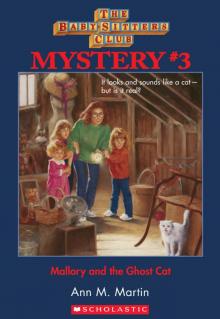 Mallory and the Ghost Cat
Mallory and the Ghost Cat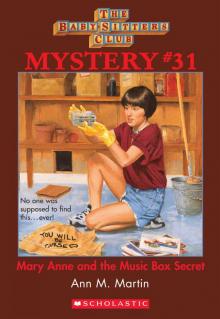 Mary Anne and the Music
Mary Anne and the Music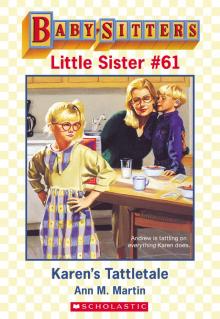 Karen's Tattletale
Karen's Tattletale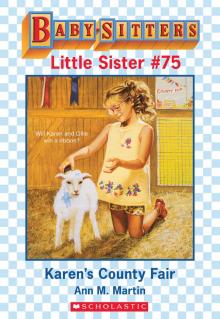 Karen's County Fair
Karen's County Fair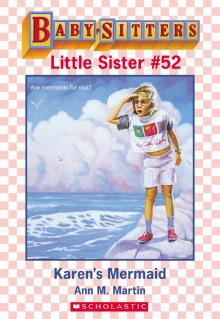 Karen's Mermaid
Karen's Mermaid Snowbound
Snowbound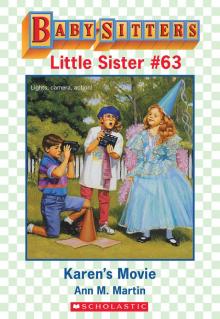 Karen's Movie
Karen's Movie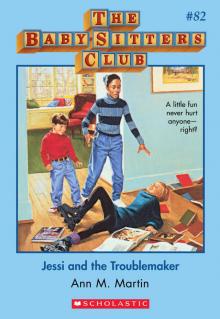 Jessi and the Troublemaker
Jessi and the Troublemaker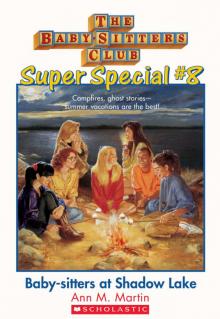 Baby-Sitters at Shadow Lake
Baby-Sitters at Shadow Lake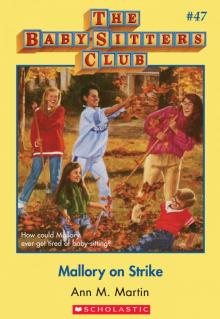 Mallory on Strike
Mallory on Strike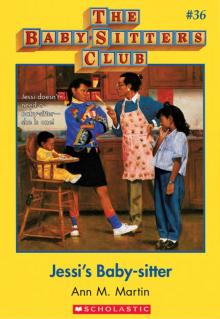 Jessi's Baby-Sitter
Jessi's Baby-Sitter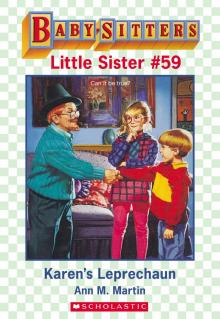 Karen's Leprechaun
Karen's Leprechaun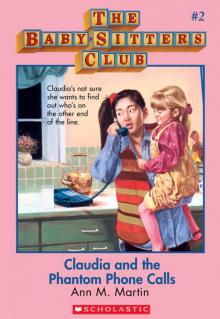 Claudia and the Phantom Phone Calls
Claudia and the Phantom Phone Calls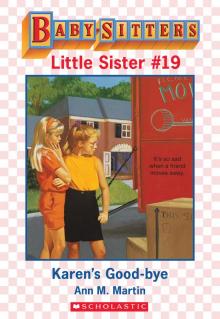 Karen's Good-Bye
Karen's Good-Bye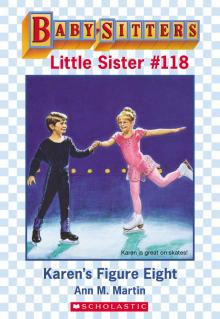 Karen's Figure Eight
Karen's Figure Eight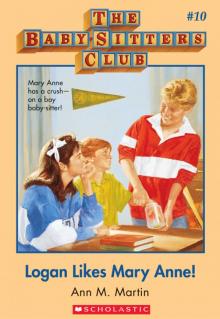 Logan Likes Mary Anne!
Logan Likes Mary Anne!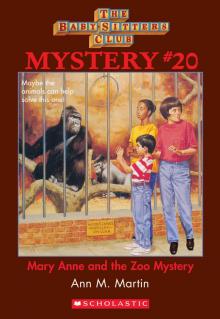 Mary Anne and the Zoo Mystery
Mary Anne and the Zoo Mystery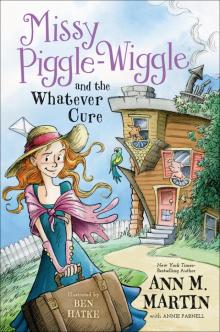 Missy Piggle-Wiggle and the Whatever Cure
Missy Piggle-Wiggle and the Whatever Cure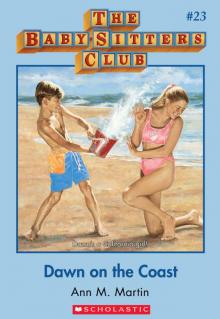 Dawn on the Coast
Dawn on the Coast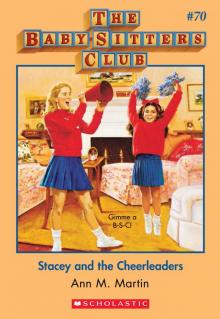 Stacey and the Cheerleaders
Stacey and the Cheerleaders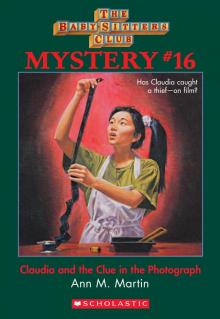 Claudia and the Clue in the Photograph
Claudia and the Clue in the Photograph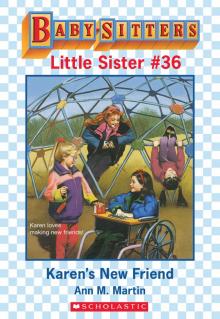 Karen's New Friend
Karen's New Friend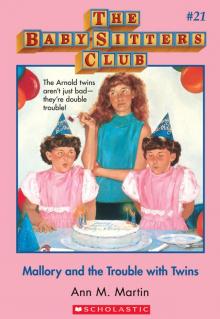 Mallory and the Trouble With Twins
Mallory and the Trouble With Twins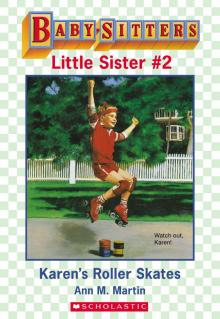 Karen's Roller Skates
Karen's Roller Skates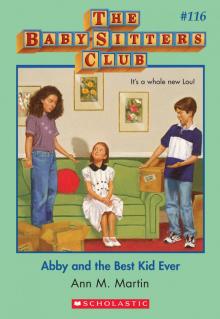 Abby and the Best Kid Ever
Abby and the Best Kid Ever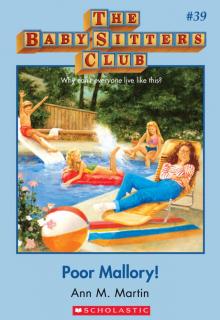 Poor Mallory!
Poor Mallory!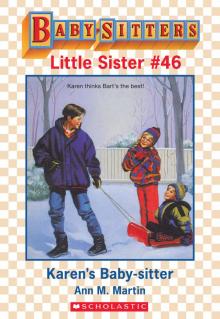 Karen's Witch
Karen's Witch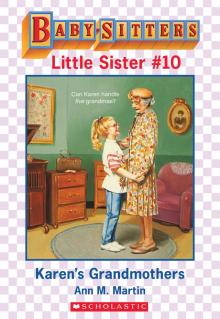 Karen's Grandmothers
Karen's Grandmothers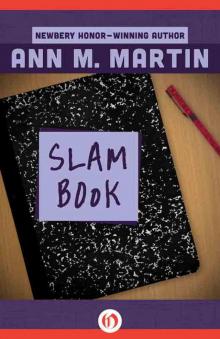 Slam Book
Slam Book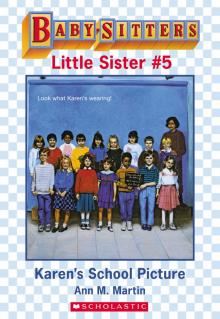 Karen's School Picture
Karen's School Picture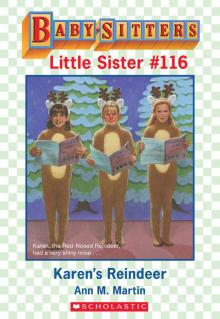 Karen's Reindeer
Karen's Reindeer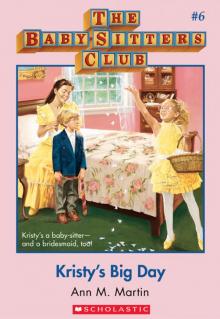 Kristy's Big Day
Kristy's Big Day The Long Way Home
The Long Way Home Karen's Sleigh Ride
Karen's Sleigh Ride On Christmas Eve
On Christmas Eve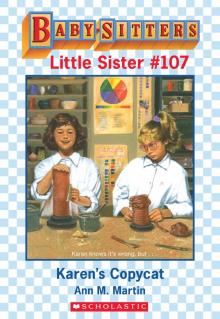 Karen's Copycat
Karen's Copycat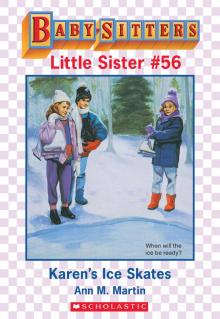 Karen's Ice Skates
Karen's Ice Skates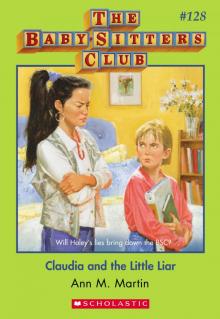 Claudia and the Little Liar
Claudia and the Little Liar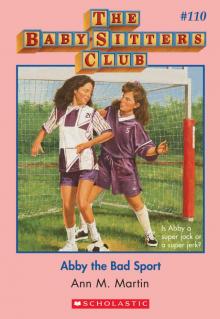 Abby the Bad Sport
Abby the Bad Sport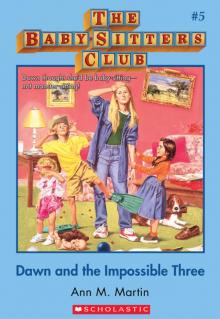 The Baby-Sitters Club #5: Dawn and the Impossible Three
The Baby-Sitters Club #5: Dawn and the Impossible Three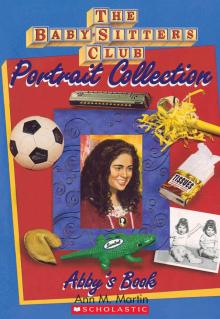 Abby's Book
Abby's Book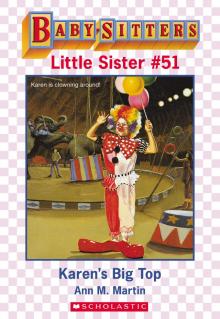 Karen's Big Top
Karen's Big Top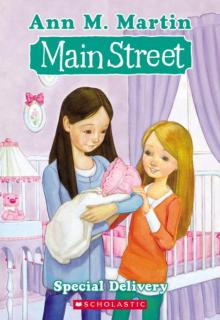 Main Street #8: Special Delivery
Main Street #8: Special Delivery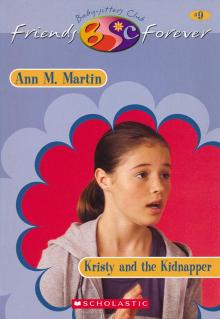 Kristy and the Kidnapper
Kristy and the Kidnapper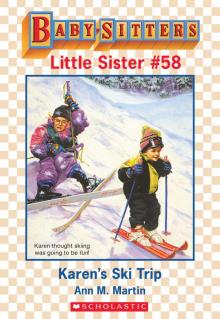 Karen's Ski Trip
Karen's Ski Trip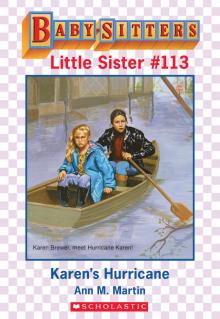 Karen's Hurricane
Karen's Hurricane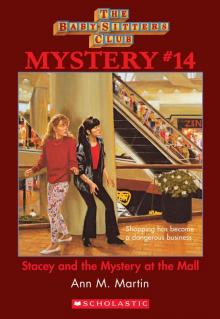 Stacey and the Mystery at the Mall
Stacey and the Mystery at the Mall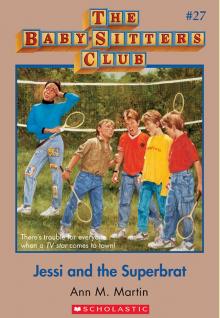 Jessi and the Superbrat
Jessi and the Superbrat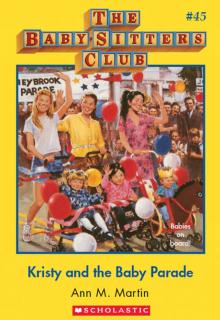 Kristy and the Baby Parade
Kristy and the Baby Parade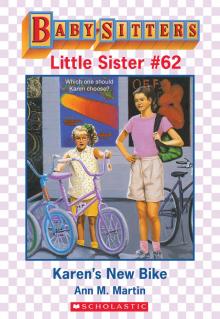 Karen's New Bike
Karen's New Bike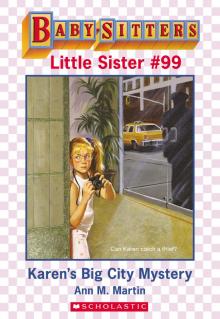 Karen's Big City Mystery
Karen's Big City Mystery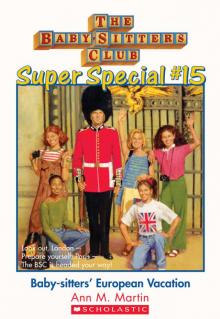 Baby-Sitters' European Vacation
Baby-Sitters' European Vacation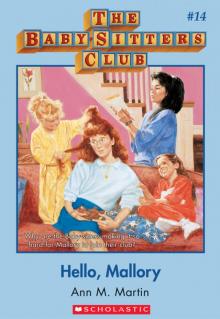 Hello, Mallory
Hello, Mallory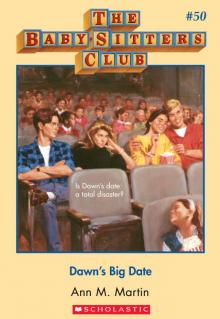 Dawn's Big Date
Dawn's Big Date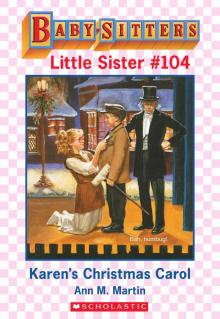 Karen's Christmas Carol
Karen's Christmas Carol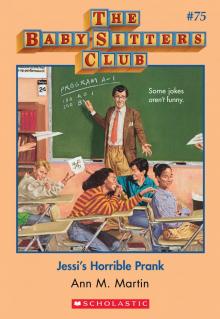 Jessi's Horrible Prank
Jessi's Horrible Prank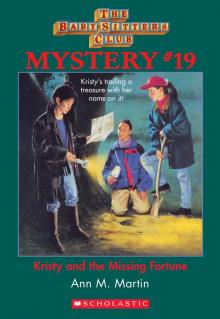 Kristy and the Missing Fortune
Kristy and the Missing Fortune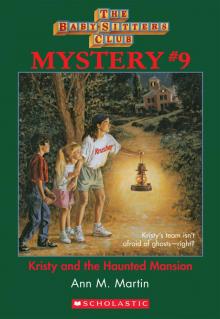 Kristy and the Haunted Mansion
Kristy and the Haunted Mansion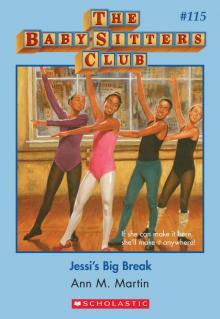 Jessi's Big Break
Jessi's Big Break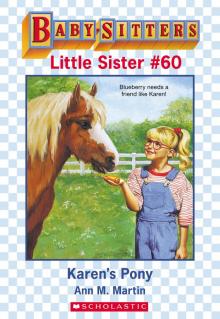 Karen's Pony
Karen's Pony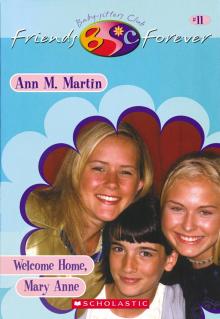 Welcome Home, Mary Anne
Welcome Home, Mary Anne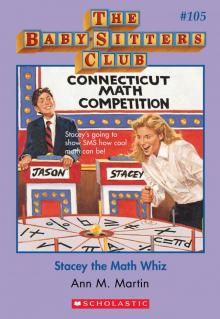 Stacey the Math Whiz
Stacey the Math Whiz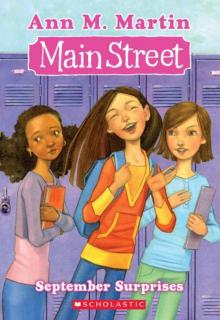 September Surprises
September Surprises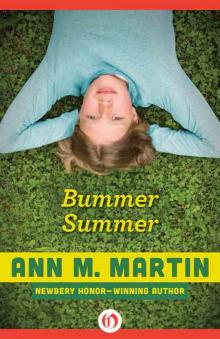 Bummer Summer
Bummer Summer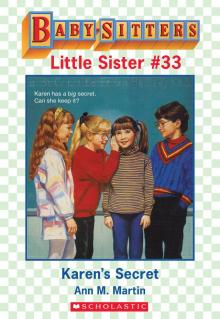 Karen's Secret
Karen's Secret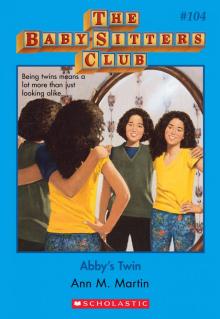 Abby's Twin
Abby's Twin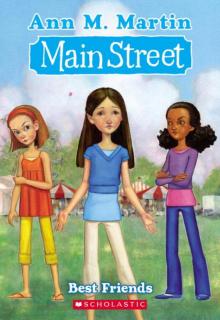 Main Street #4: Best Friends
Main Street #4: Best Friends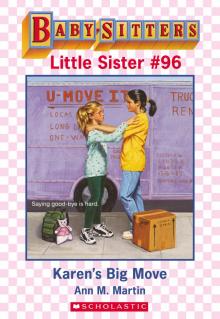 Karen's Big Move
Karen's Big Move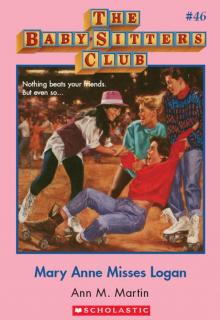 Mary Anne Misses Logan
Mary Anne Misses Logan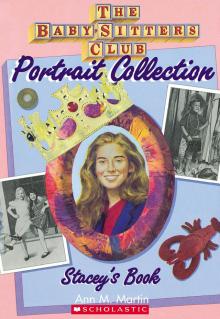 Stacey's Book
Stacey's Book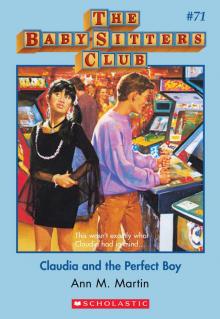 Claudia and the Perfect Boy
Claudia and the Perfect Boy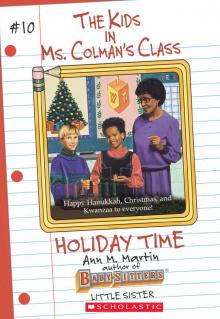 Holiday Time
Holiday Time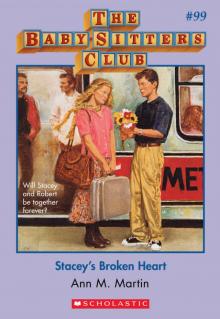 Stacey's Broken Heart
Stacey's Broken Heart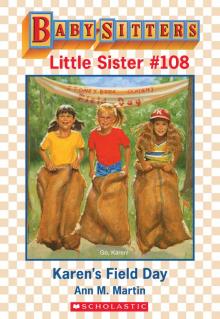 Karen's Field Day
Karen's Field Day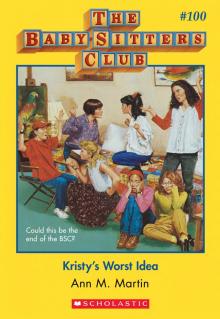 Kristy's Worst Idea
Kristy's Worst Idea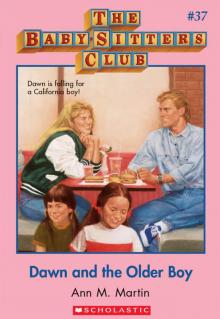 Dawn and the Older Boy
Dawn and the Older Boy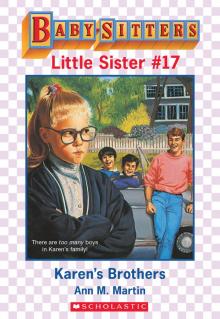 Karen's Brothers
Karen's Brothers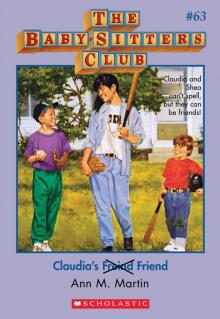 Claudia's Friend
Claudia's Friend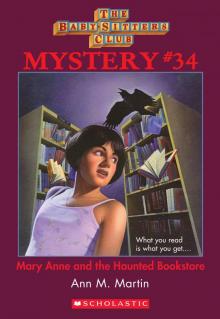 Mary Anne and the Haunted Bookstore
Mary Anne and the Haunted Bookstore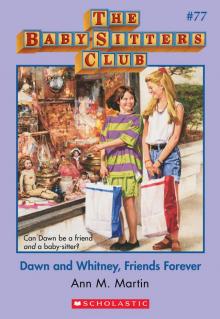 Dawn and Whitney, Friends Forever
Dawn and Whitney, Friends Forever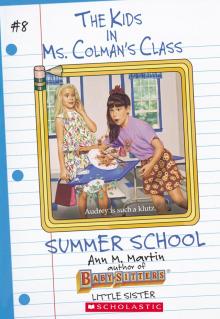 Summer School
Summer School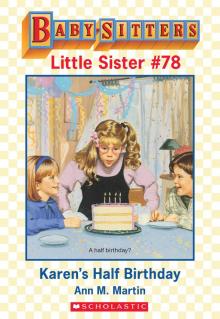 Karen's Birthday
Karen's Birthday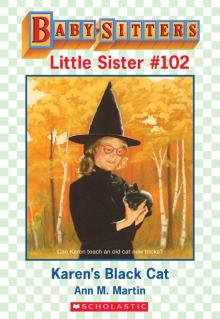 Karen's Black Cat
Karen's Black Cat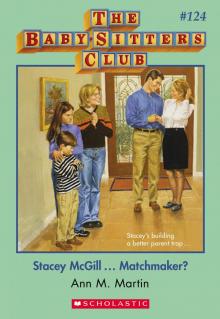 Stacey McGill... Matchmaker?
Stacey McGill... Matchmaker?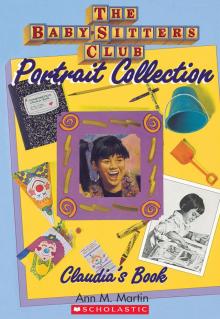 Claudia's Book
Claudia's Book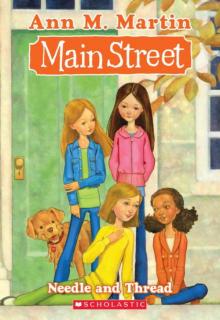 Main Street #2: Needle and Thread
Main Street #2: Needle and Thread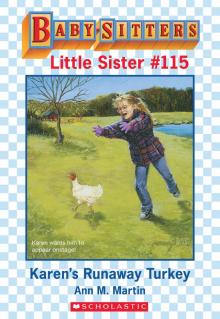 Karen's Runaway Turkey
Karen's Runaway Turkey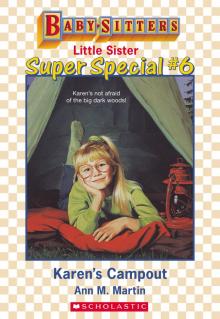 Karen's Campout
Karen's Campout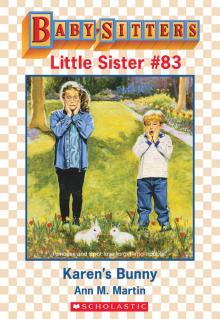 Karen's Bunny
Karen's Bunny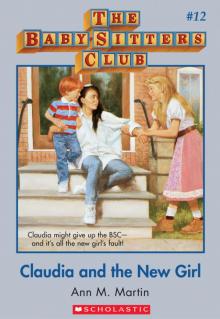 Claudia and the New Girl
Claudia and the New Girl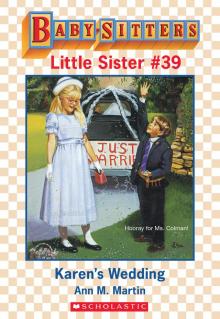 Karen's Wedding
Karen's Wedding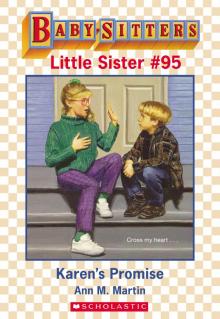 Karen's Promise
Karen's Promise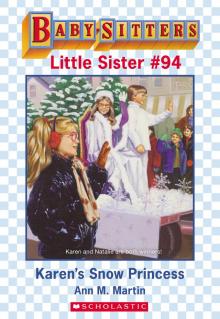 Karen's Snow Princess
Karen's Snow Princess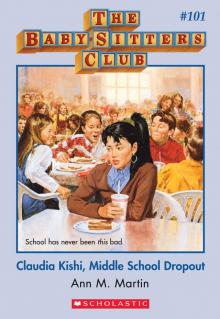 Claudia Kishi, Middle School Dropout
Claudia Kishi, Middle School Dropout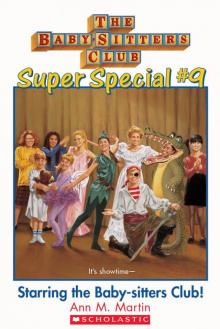 Starring the Baby-Sitters Club!
Starring the Baby-Sitters Club!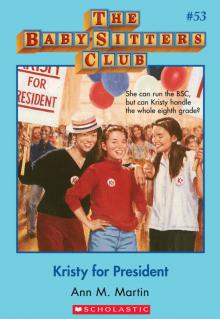 Kristy for President
Kristy for President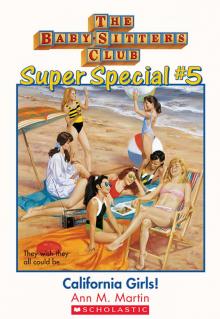 California Girls!
California Girls!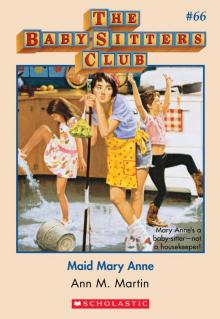 Maid Mary Anne
Maid Mary Anne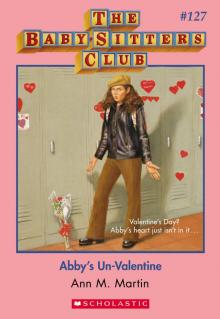 Abby's Un-Valentine
Abby's Un-Valentine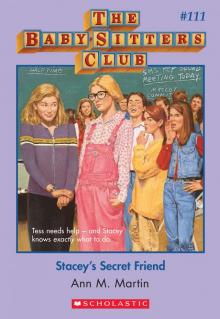 Stacey's Secret Friend
Stacey's Secret Friend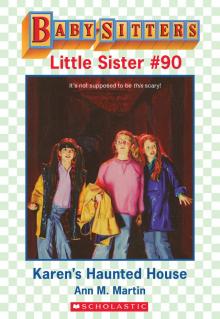 Karen's Haunted House
Karen's Haunted House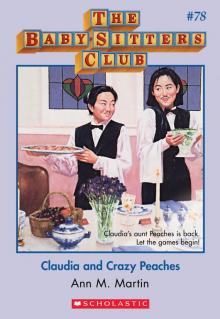 Claudia and Crazy Peaches
Claudia and Crazy Peaches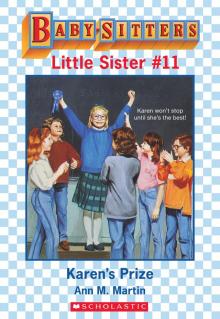 Karen's Prize
Karen's Prize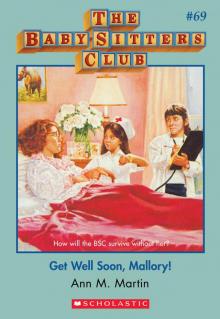 Get Well Soon, Mallory!
Get Well Soon, Mallory!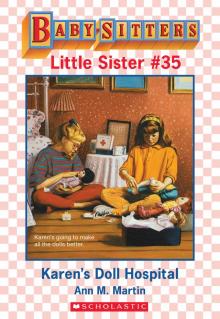 Karen's Doll Hospital
Karen's Doll Hospital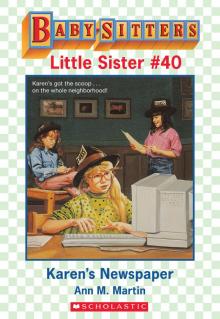 Karen's Newspaper
Karen's Newspaper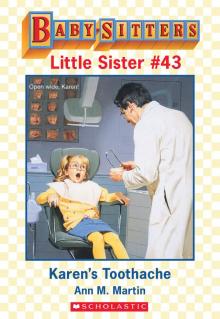 Karen's Toothache
Karen's Toothache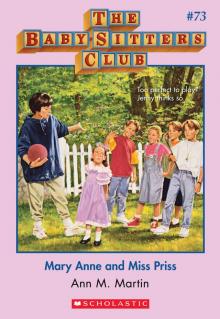 Mary Anne and Miss Priss
Mary Anne and Miss Priss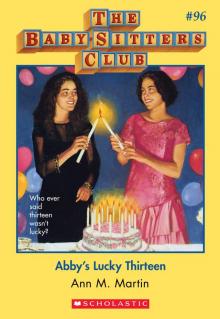 Abby's Lucky Thirteen
Abby's Lucky Thirteen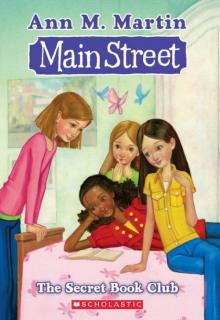 The Secret Book Club
The Secret Book Club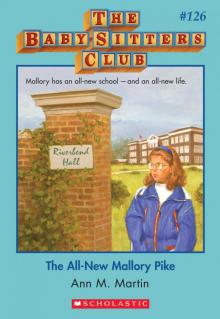 The All-New Mallory Pike
The All-New Mallory Pike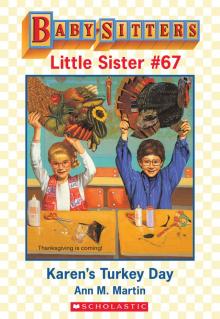 Karen's Turkey Day
Karen's Turkey Day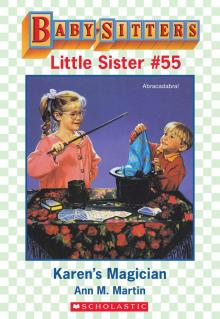 Karen's Magician
Karen's Magician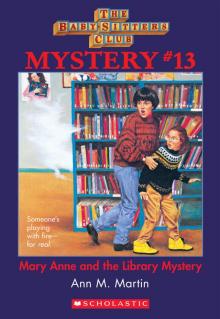 Mary Anne and the Library Mystery
Mary Anne and the Library Mystery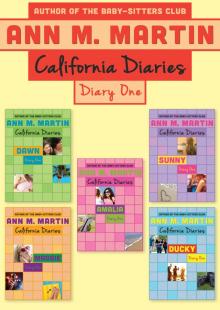 Diary One: Dawn, Sunny, Maggie, Amalia, and Ducky
Diary One: Dawn, Sunny, Maggie, Amalia, and Ducky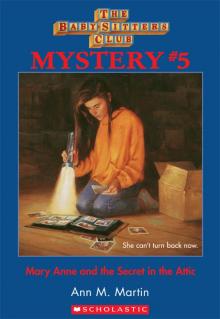 Mary Anne and the Secret in the Attic
Mary Anne and the Secret in the Attic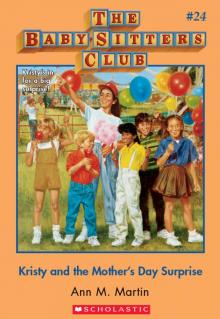 Kristy and the Mother's Day Surprise
Kristy and the Mother's Day Surprise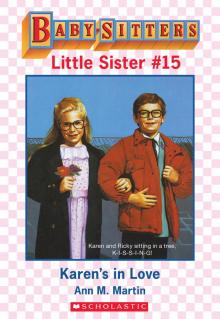 Karen's in Love
Karen's in Love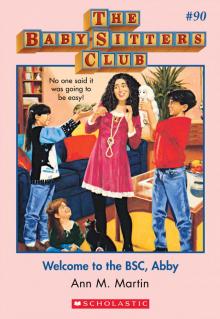 Welcome to the BSC, Abby
Welcome to the BSC, Abby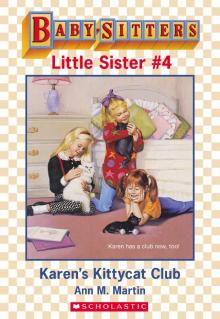 Karen's Kittycat Club
Karen's Kittycat Club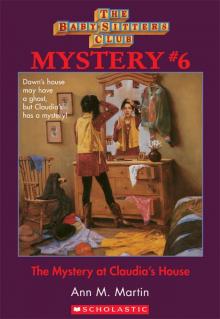 The Mystery at Claudia's House
The Mystery at Claudia's House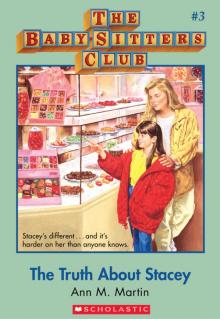 The Truth About Stacey
The Truth About Stacey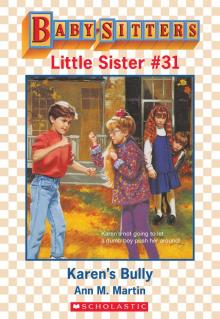 Karen's Bully
Karen's Bully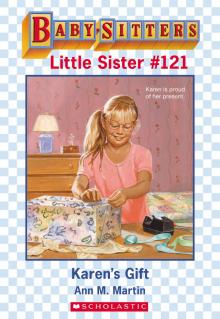 Karen's Gift
Karen's Gift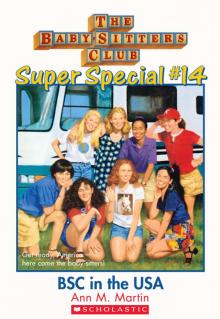 BSC in the USA
BSC in the USA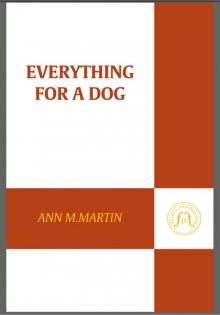 Everything for a Dog
Everything for a Dog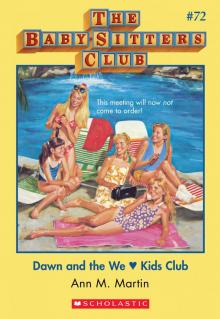 Dawn and the We Love Kids Club
Dawn and the We Love Kids Club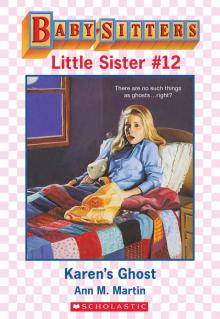 Karen's Ghost
Karen's Ghost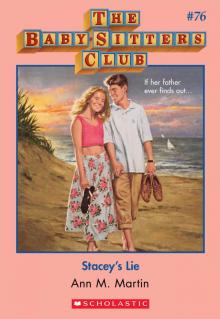 Stacey's Lie
Stacey's Lie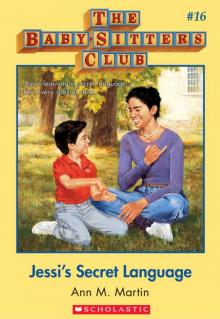 Jessi's Secret Language
Jessi's Secret Language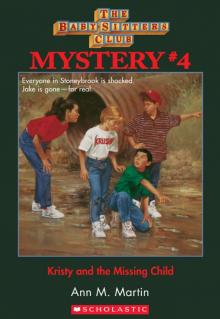 Kristy and the Missing Child
Kristy and the Missing Child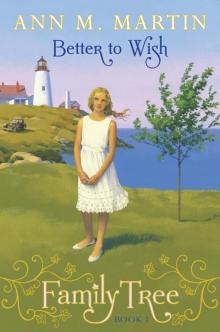 Better to Wish
Better to Wish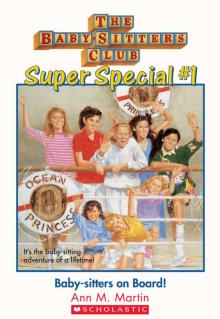 Baby-Sitters on Board!
Baby-Sitters on Board!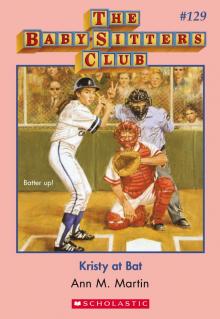 Kristy at Bat
Kristy at Bat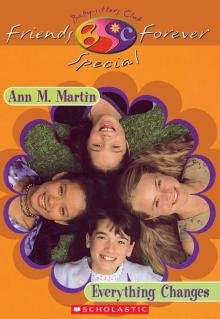 Everything Changes
Everything Changes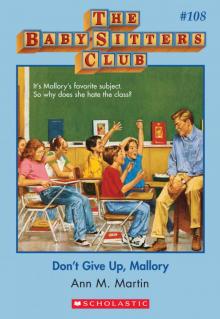 Don't Give Up, Mallory
Don't Give Up, Mallory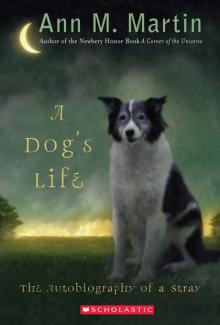 A Dog's Life: The Autobiography of a Stray
A Dog's Life: The Autobiography of a Stray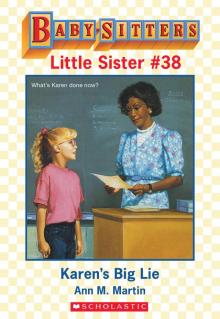 Karen's Big Lie
Karen's Big Lie Karen's Show and Share
Karen's Show and Share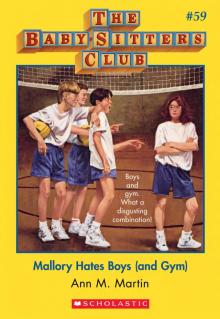 Mallory Hates Boys (and Gym)
Mallory Hates Boys (and Gym)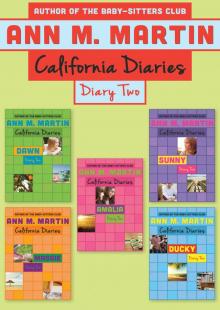 Diary Two: Dawn, Sunny, Maggie, Amalia, and Ducky
Diary Two: Dawn, Sunny, Maggie, Amalia, and Ducky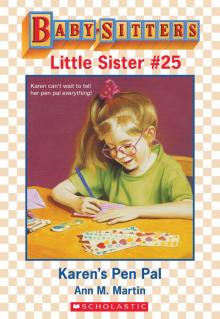 Karen's Pen Pal
Karen's Pen Pal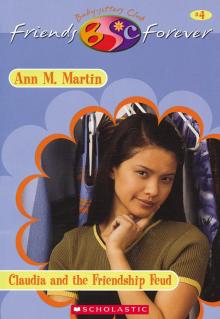 Claudia and the Friendship Feud
Claudia and the Friendship Feud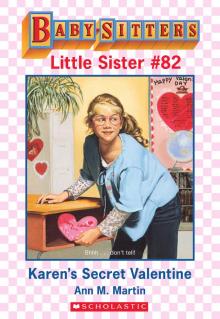 Karen's Secret Valentine
Karen's Secret Valentine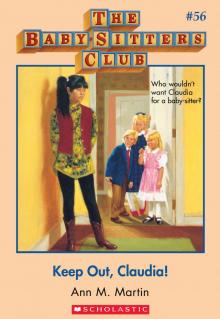 Keep Out, Claudia!
Keep Out, Claudia! Aloha, Baby-Sitters!
Aloha, Baby-Sitters!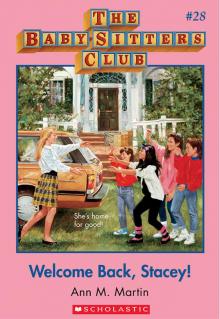 Welcome Back, Stacey
Welcome Back, Stacey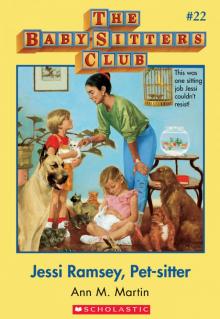 Jessi Ramsey, Pet-Sitter
Jessi Ramsey, Pet-Sitter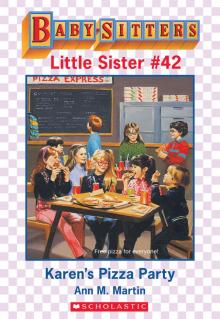 Karen's Pizza Party
Karen's Pizza Party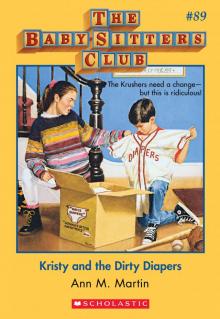 Kristy and the Dirty Diapers
Kristy and the Dirty Diapers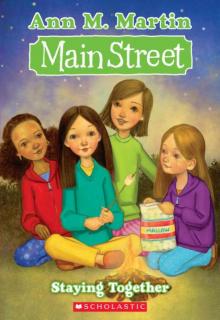 Staying Together
Staying Together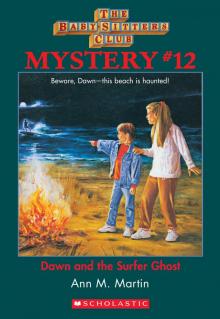 Dawn and the Surfer Ghost
Dawn and the Surfer Ghost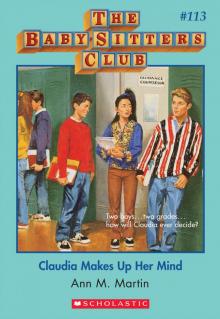 Claudia Makes Up Her Mind
Claudia Makes Up Her Mind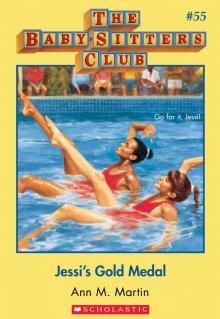 Jessi's Gold Medal
Jessi's Gold Medal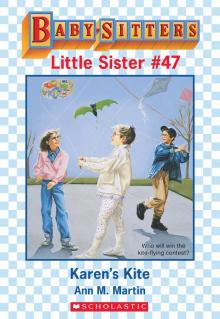 Karen's Kite
Karen's Kite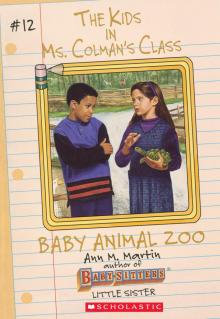 Baby Animal Zoo
Baby Animal Zoo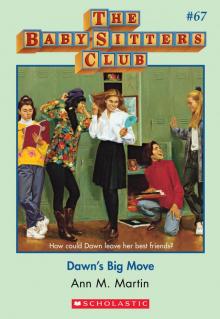 Dawn's Big Move
Dawn's Big Move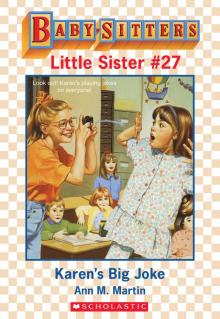 Karen's Big Joke
Karen's Big Joke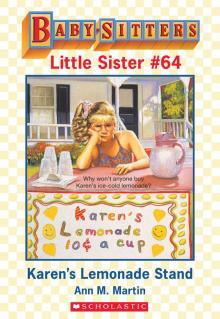 Karen's Lemonade Stand
Karen's Lemonade Stand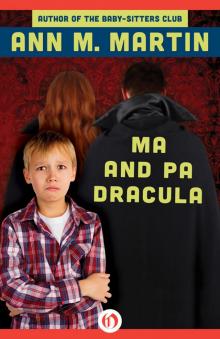 Ma and Pa Dracula
Ma and Pa Dracula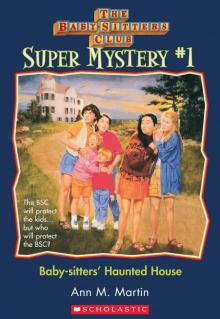 Baby-Sitters' Haunted House
Baby-Sitters' Haunted House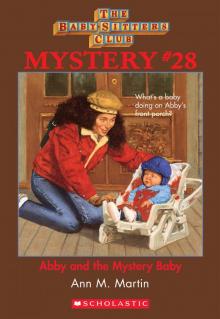 Abby and the Mystery Baby
Abby and the Mystery Baby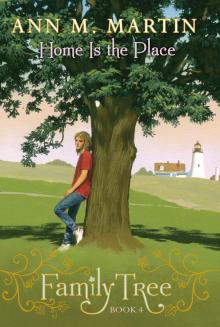 Home Is the Place
Home Is the Place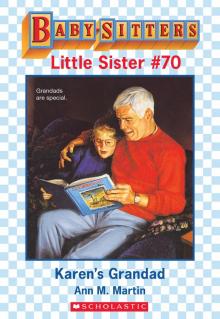 Karen's Grandad
Karen's Grandad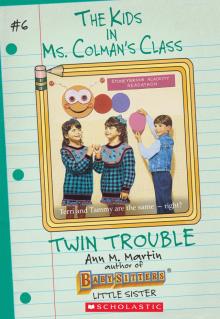 Twin Trouble
Twin Trouble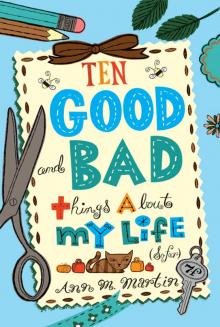 Ten Good and Bad Things About My Life (So Far)
Ten Good and Bad Things About My Life (So Far)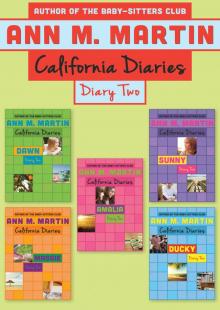 Diary Two
Diary Two Baby-Sitters Club 027
Baby-Sitters Club 027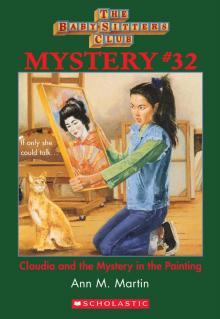 Claudia and the Mystery Painting
Claudia and the Mystery Painting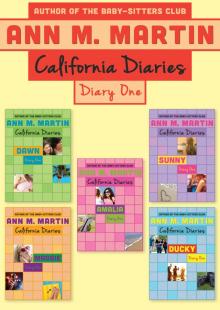 Diary One
Diary One Baby-Sitters Club 037
Baby-Sitters Club 037 Baby-Sitters Club 028
Baby-Sitters Club 028 Baby-Sitters Club 085
Baby-Sitters Club 085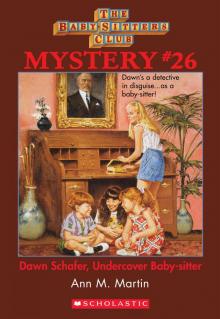 Dawn Schaffer Undercover Baby-Sitter
Dawn Schaffer Undercover Baby-Sitter Jessi's Babysitter
Jessi's Babysitter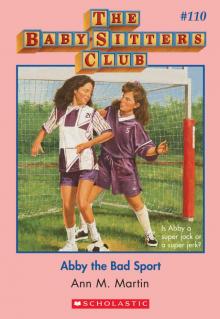 The Baby-Sitters Club #110: Abby the Bad Sport (Baby-Sitters Club, The)
The Baby-Sitters Club #110: Abby the Bad Sport (Baby-Sitters Club, The) Karen's Little Sister
Karen's Little Sister Baby-Sitters Club 058
Baby-Sitters Club 058 Claudia And The Genius On Elm St.
Claudia And The Genius On Elm St.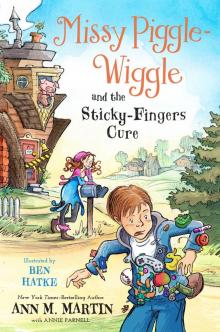 Missy Piggle-Wiggle and the Sticky-Fingers Cure
Missy Piggle-Wiggle and the Sticky-Fingers Cure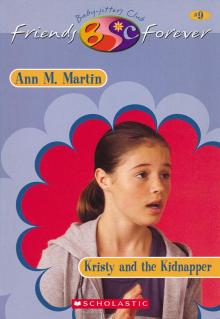 Kristy and Kidnapper
Kristy and Kidnapper Baby-Sitters Club 041
Baby-Sitters Club 041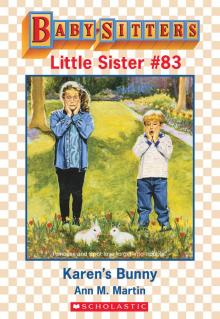 Karen's Bunny Trouble
Karen's Bunny Trouble Baby-Sitters Club 032
Baby-Sitters Club 032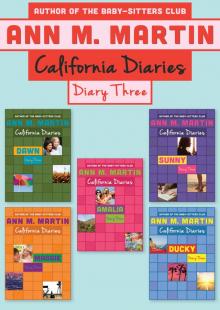 Diary Three
Diary Three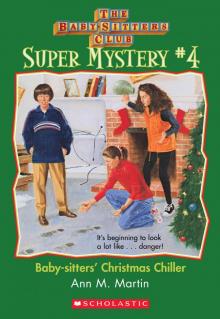 Christmas Chiller
Christmas Chiller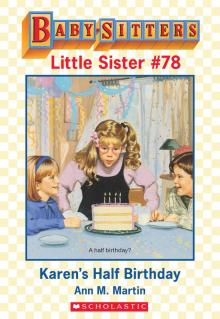 Karen's Half-Birthday
Karen's Half-Birthday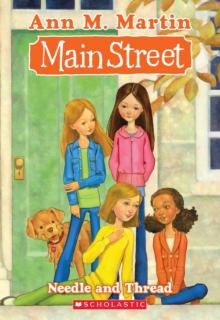 Needle and Thread
Needle and Thread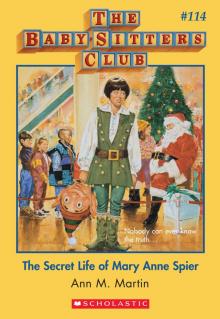 Secret Life of Mary Anne Spier
Secret Life of Mary Anne Spier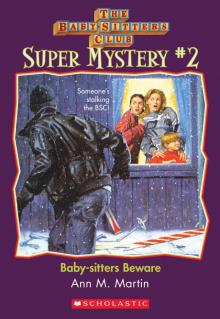 Baby-Sitters Beware
Baby-Sitters Beware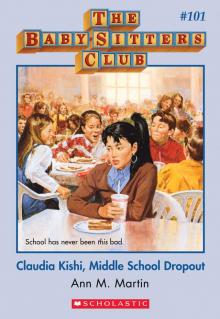 Claudia Kishi, Middle School Drop-Out
Claudia Kishi, Middle School Drop-Out Logan Likes Mary Anne !
Logan Likes Mary Anne ! Baby-Sitters Club 061
Baby-Sitters Club 061 Best Friends
Best Friends Baby-Sitters Club 031
Baby-Sitters Club 031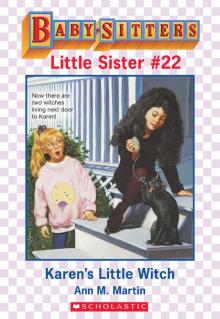 Karen's Little Witch
Karen's Little Witch Jessi Ramsey, Petsitter
Jessi Ramsey, Petsitter Baby-Sitters Club 123
Baby-Sitters Club 123 Baby-Sitters Club 059
Baby-Sitters Club 059 Baby-Sitters Club 033
Baby-Sitters Club 033 Baby-Sitters Club 060
Baby-Sitters Club 060 Baby-Sitters Club 094
Baby-Sitters Club 094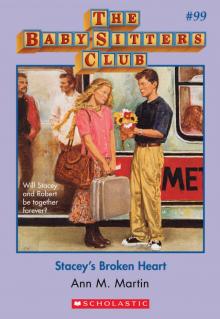 The Baby-Sitters Club #99: Stacey's Broken Heart
The Baby-Sitters Club #99: Stacey's Broken Heart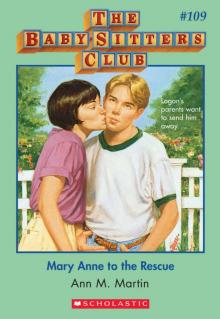 The Baby-Sitters Club #109: Mary Anne to the Rescue (Baby-Sitters Club, The)
The Baby-Sitters Club #109: Mary Anne to the Rescue (Baby-Sitters Club, The) Mystery At Claudia's House
Mystery At Claudia's House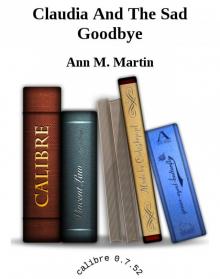 Claudia And The Sad Goodbye
Claudia And The Sad Goodbye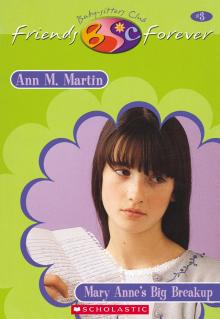 Mary Anne's Big Break-Up
Mary Anne's Big Break-Up Baby-Sitters Club 025
Baby-Sitters Club 025 Baby-Sitters Club 042
Baby-Sitters Club 042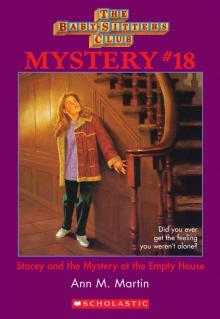 Stacey and the Mystery of the Empty House
Stacey and the Mystery of the Empty House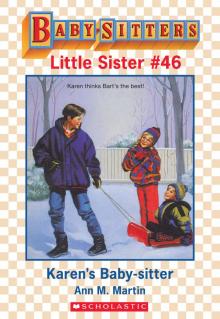 Karen's Baby-Sitter
Karen's Baby-Sitter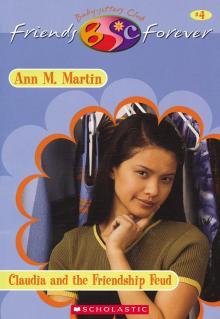 Claudia's Friendship Feud
Claudia's Friendship Feud Baby-Sitters Club 090
Baby-Sitters Club 090 Baby-Sitters Club 021
Baby-Sitters Club 021 Baby-Sitters Club 056
Baby-Sitters Club 056 Baby-Sitters Club 040
Baby-Sitters Club 040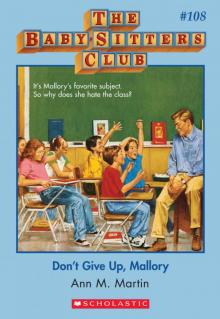 The Baby-Sitters Club #108: Don't Give Up, Mallory (Baby-Sitters Club, The)
The Baby-Sitters Club #108: Don't Give Up, Mallory (Baby-Sitters Club, The)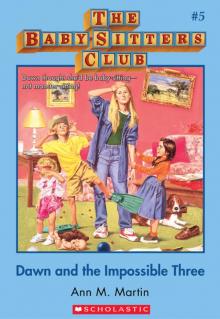 Dawn and the Impossible Three
Dawn and the Impossible Three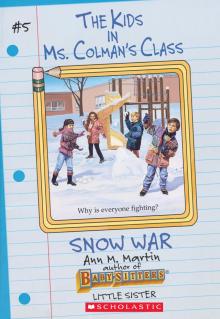 The Snow War
The Snow War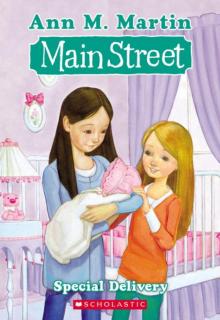 Special Delivery
Special Delivery Baby-Sitters Club 057
Baby-Sitters Club 057 Mary Anne And Too Many Babies
Mary Anne And Too Many Babies Baby-Sitters Club 030
Baby-Sitters Club 030